your dermal diagnosis™ results
Good day,
We're thrilled you're taking proactive steps to understand your skin better.
Below, you'll find your most recent Dermal Diagnosis™ results. Use this data as a roadmap to achieving healthier skin.
| Date | Dermal Diagnosis™ | Profile and Treatment Plan |
|---|---|---|
DERMAL DIAGNOSIS™ RESULT BREAKDOWN
| Aging Score | Hydration Score | Pigmentation Score | Inflammation category |
|---|---|---|---|
| Date | Dermal Diagnosis™ |
|---|---|
DERMAL DIAGNOSIS™ RESULT BREAKDOWN
| Aging Score | |
| Hydration Score | |
| Pigmentation Score | |
| Inflammation category |

's Dermal Diagnosis™ Profile:
Aging . Dry . Breakouts
during pregnancy
Aging . Dry . Breakouts
- during pregnancy
Aging . Dry . Breakouts
- during pregnancy
your frustrations
- Congested pores in the form of blackheads and, in some cases, also whiteheads.
- Impaired and dehydrated skin barrier.
- Premature skin aging.
- Rough skin texture.
- Sensitive skin that reacts to various stimuli and products.
your goals
- Bright, hydrated and healthy skin.
- Protected and healed skin barrier.
- No allergic skin reactions.
- Prevention and correction of premature skin aging including lines and wrinkles.
- Smooth skin texture with no breakouts and inflammation.

Reduced Oiliness

Even Skin Tone

Protection
-
Reduced Oiliness: You are less likely to experience the sheen and discomfort associated with oily skin types. This can contribute to a matte finish and potentially less clogged pores outside of breakout areas.
-
Minimal Hyperpigmentation: Dry skin types might notice fewer pigmentation changes without the frequent inflammation from acne, which can lead to post-inflammatory hyperpigmentation. Additionally, your dry skin type may be less exposed to injuries or irritations that can lead to pigmentation issues.
-
Natural Protection Against Certain Bacteria: The dry nature of your skin means it's less hospitable to certain bacteria that thrive in oily environments, potentially reducing your risk of some types of bacterial skin infections.

Dehydrated Skin

Aging skin

Acne Breakouts

↓ Barrier Function
-
Dehydration and Dryness: Your Skin Type often struggles with maintaining optimal hydration levels, leading to a compromised skin barrier that cannot effectively retain moisture. This exacerbates dryness and potentially makes the skin feel tight and uncomfortable.
-
Visible Signs of Aging: The aging process may be more noticeable with your skin type due to the inherent dryness and the potential for breakouts to cause post-inflammatory changes or damage that accentuates the appearance of fine lines, wrinkles, and a loss of skin elasticity.
-
Breakouts: Despite being less oily, your skin type is still prone to breakouts, possibly due to dead skin cell accumulation and a compromised moisture barrier. Managing breakouts without further drying out the skin or causing irritation requires a delicate balance in your skincare routine.
-
Compromised Skin Barrier: Aging and dryness contribute to a weakened skin barrier, making it more vulnerable to external aggressors and less able to repair and retain moisture. This leads to a cycle of dryness, irritation, and inflammation.
Aging . Dry . Breakouts during pregnancy
Treatment objectives

Smooth skin texture
Replace dull and dead skin cells with remodeled skin layers. Resurfacing procedures can induce new collagen formation with a more structured pattern.

Deeply Hydrate and Nourish
Advance the skin's hydration capabilities by boosting its capacity to attract and retain moisture at a cellular level. Promote the enhancement of the skin's own hydrating agents, ensuring sustained moisture balance and preventing dryness.

Skin Barrier Restoration
Repair damaged skin barrier and restore barrier function. Boost the protective skin layer by increasing the production of elastin, collagen, ceramides, and lipids.

Prevent & Repair Premature Aging
Protect the skin from factors that accelerate aging, such as UV exposure and pollution, and correct existing signs of aging, like fine lines, wrinkles, and loss of elasticity.

Reduce Inflammation
Alleviate inflammation and redness by restoring equilibrium to the skin's microbiome. Focus on creating a harmonious skin environment that supports healthy bacterial flora, essential for maintaining skin health and preventing breakouts.

DNA Protection and Repair
Safeguard and repair UV-induced DNA damage, utilizing a blend of UV defense, Retinol, Niacinamide, and antioxidants. This strategy prevents future damage and aids in the repair of existing cellular impairments.
Aging . Dry . Breakouts during pregnancy
Beneficial Active Ingredients
Azelaic acid
Azelaic acid, a naturally occurring dicarboxylic acid, is an effective ingredient in dermatological treatments, particularly for acne, rosacea, and hyperpigmentation, with antimicrobial and anti-inflammatory properties.
Physiological Effects
- Anti-Inflammatory Properties: Azelaic acid reduces inflammation, effectively treating inflammatory skin conditions like acne and rosacea.
- Antimicrobial Action: It possesses antimicrobial properties that target acne-causing bacteria (Propionibacterium acnes), helping to reduce acne outbreaks.
- Keratolytic Effects: It helps unclog pores and reduce the formation of comedones (black and whiteheads) by normalizing the shedding of skin cells.
- Depigmenting Agent: Azelaic acid effectively treats hyperpigmentation disorders, including melasma, as it inhibits tyrosinase, an enzyme involved in melanin production.
Managing Dermatological Conditions
- Acne: Azelaic acid inhibits the proliferation of acne-causing bacteria on the skin’s surface, thereby reducing bacterial growth and inflammation. Its antibacterial activity is primarily against Propionibacterium acnes, a key bacterium involved in the development of acne. Furthermore, azelaic acid helps unclog pores and reduce skin cell buildup, effectively treating mild to moderate acne.
- Rosacea: Azelaic acid's anti-inflammatory action helps to reduce redness and swelling associated with rosacea. In addition, azelaic acid's ability to reduce keratinization (the process by which skin cells become more fibrous and less flexible) contributes to its effectiveness in this condition.
- Pigmentation: Azelaic acid effectively treats melasma and post-inflammatory hyperpigmentation by inhibiting tyrosinase, an enzyme in melanin production. This helps to reduce the formation of excess pigment and can lead to a more even skin tone.
References
- Fitton, A., & Goa, K. L. (1991). Azelaic Acid. Drugs.
- Gollnick, H., & Schramm, M. (1998). Topical drug treatment in acne. Dermatology.
- Passeron, T., et al. (2019). Melasma treatment: A novel approach using a topical agent that contains an anti-estrogen and a low-dose retinoid. G Ital Dermatol Venereol.
- Wolf, J. E., Kerrouche, N., & Arsonnaud, S. (2006). Efficacy and safety of once-daily metronidazole 1% gel compared with twice-daily azelaic acid 15% gel in the treatment of rosacea. Cutis, 77(4 Suppl), 3-11.
- Hollinger, J. C., Angra, K., & Halder, R. M. (2018). Are natural ingredients effective in the management of hyperpigmentation? A systematic review. The Journal of clinical and aesthetic dermatology, 11(2), 28.
Niacinamide
Niacinamide offers several benefits for the skin, primarily due to its anti-inflammatory and antioxidant properties. It reduces the redness and inflammation associated with acne, rosacea, and other inflammatory skin conditions. Additionally, niacinamide's ability to improve the skin's barrier function benefits all skin types, particularly those with eczema or mature skin.
Another significant benefit of niacinamide is its role in reducing hyperpigmentation. Studies have shown that it can decrease the transfer of melanin to the epidermis, helping to fade dark spots and even out skin tone.
Niacinamide also plays a role in reducing the visible signs of aging. It has been found to stimulate collagen production and improve skin elasticity, reducing fine lines and wrinkles. Its antioxidant properties further protect the skin from environmental damage, such as pollution and UV radiation, which contribute to premature aging.
The efficacy of niacinamide and its ability to address multiple skin concerns simultaneously has led to its growing popularity in both over-the-counter and prescription skincare formulations.
Physiological Effects
- Barrier Function Enhancement: Niacinamide helps strengthen the skin’s barrier function by increasing the production of ceramides, lipids that keep the skin hydrated and protect against environmental damage.
- Anti-inflammatory Properties: It has notable anti-inflammatory effects, which are beneficial in reducing redness and inflammation associated with acne, eczema, and other inflammatory skin conditions.
- Sebum Regulation: Niacinamide helps regulate sebum production, which controls excess oiliness and can benefit acne-prone skin.
- Hyperpigmentation Reduction: It reduces hyperpigmentation by inhibiting melanosome transfer from melanocytes to keratinocytes, leading to an even skin tone.
- Anti-aging Effects: Niacinamide helps reduce the appearance of fine lines and wrinkles by boosting collagen production and improving skin elasticity.
- Antioxidant Activity: It has antioxidant properties, protecting the skin from oxidative stress and environmental aggressors like UV radiation and pollution.
Managing Dermatological Conditions
- Acne and Oily Skin: Niacinamide effectively manages acne and oily skin by regulating sebum and reducing inflammation.
- Hyperpigmentation and Melasma: Its ability to reduce melanin transfer benefits it in treating hyperpigmentation and melasma.
- Aging Skin: Niacinamide targets wrinkles and loss of firmness.
- Skin Barrier Disorders: Niacinamide is beneficial in treating skin barrier disorders like atopic dermatitis and eczema by enhancing barrier function and hydration.
- Photodamage and Skin Protection: It helps mitigate the effects of photodamage and provides some degree of protection against environmental damage.
References
- Gehring, W. (2004). Nicotinic acid/niacinamide and the skin. Journal of Cosmetic Dermatology.
- Bissett, D. L., Oblong, J. E., & Berge, C. A. (2005). Niacinamide: A B vitamin that improves aging facial skin appearance. Dermatologic Surgery.
- Snaidr, V. A., Damian, D. L., & Halliday, G. M. (2019). Nicotinamide for photoprotection and skin cancer chemoprevention: A review of efficacy and safety. Experimental Dermatology.
- Navarrete-Solís, J. et al. (2011). A Double-Blind, Randomized Clinical Trial of Niacinamide 4% versus Hydroquinone 4% in the Treatment of Melasma. Dermatology Research and Practice, 2011.
Salicylic acid
Salicylic acid, a renowned beta hydroxy acid (BHA), is a cornerstone in dermatology and skincare due to its exceptional keratolytic and comedolytic properties. It uniquely penetrates oil-laden hair follicle pores, making it particularly effective in treating acne-prone and oily skin types.
Salicylic acid works by dissolving skin debris that clogs pores and causes acne, namely sebum and dead skin cells. It's a mild anti-bacterial- and a powerful anti-inflammatory agent, which helps to reduce the redness and swelling associated with breakouts.
What sets salicylic acid apart in dermatological treatments is its ability to exfoliate the skin not just on the surface but within the pores themselves. This is due to its oil-soluble nature, which allows it to penetrate deep into the pores and dissolve the keratin plugs that lead to blackheads and whiteheads.
Furthermore, salicylic acid also can adjust the pH of the skin, creating an environment less favorable for the growth of acne-causing bacteria. Salicylic acid's efficacy in treating various skin conditions, particularly acne, has been extensively documented in the scientific literature. Studies have consistently shown its ability to reduce acne lesions in terms of count and severity. Additionally, salicylic acid is highly recommended for its effectiveness in treating other skin conditions, such as psoriasis and dandruff, due to its ability to soften and remove scales and flakes from the skin.
Physiological Effects
- Keratolytic Action: Salicylic acid is known for its ability to exfoliate the skin by dissolving the intercellular 'glue' that holds skin cells together. This helps remove dead skin cells and unclog pores.
- Comedolytic Effect: It is particularly effective in reducing comedones (blackheads and whiteheads) by unclogging pores and preventing the formation of new comedones.
- Anti-inflammatory Properties: Salicylic acid reduces inflammation, which is beneficial in treating acne and other inflammatory skin conditions.
- Sebum Regulation: It helps to regulate oil production, making it a valuable ingredient for managing oily and acne-prone skin.
- Penetration Enhancement: Due to its lipophilic nature, it can penetrate sebum-filled follicles, effectively treating acne located deep within the pores.
Managing Dermatological Conditions
- Acne Vulgaris: Salicylic acid is a cornerstone in acne treatment, effectively preventing and treating existing acne lesions.
- Psoriasis: Its keratolytic properties effectively soften and remove scales associated with psoriasis.
- Warts: Salicylic acid is commonly used to treat warts because it can exfoliate and remove the thickened skin.
- Seborrheic Dermatitis: It helps manage seborrheic dermatitis by reducing scaling and redness.
- Keratosis Pilaris: Salicylic acid can aid in smoothing the rough bumps associated with keratosis pilaris.
References
- Zaenglein, A. L., Pathy, A. L., Schlosser, B. J., Alikhan, A., Baldwin, H. E., Berson, D. S., & Thiboutot, D. M. (2016). Guidelines of care for the management of acne vulgaris. Journal of the American Academy of Dermatology, 74(5), 945-973.e33.
- Kornhauser, A., Coelho, S. G., & Hearing, V. J. (2010). Applications of hydroxy acids: classification, mechanisms, and photoactivity. Clinical, cosmetic and investigational dermatology, 3, 135.
- Zander, E., & Weisman, S. (1992). Treatment of acne vulgaris with salicylic acid pads. Clinical Therapeutics.
- Gupta, A. K., & Nicol, K. (2004). The use of sulfur in dermatology. Journal of Drugs in Dermatology.
Glycolic acid
Glycolic acid is highly acclaimed for its remarkable exfoliating and rejuvenating properties. Its small molecular size enables deep skin penetration, fostering efficient exfoliation at the cellular level.
Glycolic acid’s water solubility allows it to penetrate the upper layers of the skin easily. Its primary mechanism of action involves weakening the bonds between dead skin cells, promoting their shedding, and revealing the newer, healthier skin beneath. This process of accelerated cell turnover is instrumental in addressing a range of skin concerns, from aging signs like fine lines and wrinkles to texture irregularities and hyperpigmentation.
Glycolic acid's efficacy extends beyond mere exfoliation. It's also recognized for stimulating collagen production, a crucial protein in maintaining skin's elasticity and firmness. This aspect contributes to its anti-aging benefits. Furthermore, its hydrating properties add to its appeal, as they help increase the skin's capacity to retain moisture, leading to a more supple and vibrant complexion.
Clinical studies have consistently supported glycolic acid's role in improving skin appearance. Research indicates significant improvements in skin texture and pigmentation and the visible reduction of wrinkles and fine lines with glycolic acid.
Physiological Effects
- Exfoliation: Glycolic acid is a powerful exfoliant. It dissolves the bonds between dead skin cells on the skin’s surface, facilitating their removal and revealing newer, healthier skin underneath.
- Increased Collagen Production: It stimulates collagen production, which is essential for skin elasticity and firmness. This action helps reduce the appearance of fine lines and wrinkles.
- Enhanced Skin Hydration: Glycolic acid improves the skin's ability to retain moisture, enhancing hydration and a more plump, vibrant skin appearance.
- Skin Brightening: Removing dead skin cells can brighten the complexion and reduce the appearance of dark spots and hyperpigmentation.
- Improved Skin Texture: Regular use of glycolic acid can lead to smoother, more even textured skin, making it beneficial for conditions like keratosis pilaris.
- Acne Treatment: Its exfoliating properties help in unclogging pores, thereby reducing the occurrence of acne breakouts.
Managing Dermatological Conditions
- Aging Skin: Glycolic acid is widely used in anti-aging products to reduce signs of aging, such as fine lines, wrinkles, and age spots.
- Acne-Prone Skin: It helps manage acne by exfoliating the skin and removing blockage from pores.
- Hyperpigmentation: It effectively treats hyperpigmentation by accelerating the removal of hyperpigmented skin cells.
- Textural Irregularities: Glycolic acid can improve skin texture and is beneficial for treating keratosis pilaris and other conditions of rough skin.
- Sun-Damaged Skin: It helps rejuvenate sun-damaged skin by accelerating cell turnover and collagen synthesis.
References
- Bernstein, E. F. (2001). Glycolic acid treatment increases type I collagen mRNA and hyaluronic acid content of human skin. Dermatologic Surgery.
- Kornhauser, A., Coelho, S. G., & Hearing, V. J. (2010). Applications of hydroxy acids: classification, mechanisms, and photoactivity. Clinical, Cosmetic and Investigational Dermatology.
- Sharad, J. (2013). Glycolic acid peel therapy – a current review. Clinical, Cosmetic and Investigational Dermatology.
- Smith, W. P. (1996). Epidermal and dermal effects of topical lactic acid. Journal of the American Academy of Dermatology, 35(3), 388-391.
Alpha Arbutin
Alpha Arbutin is a derivative of hydroquinone and a biosynthetic active ingredient. Its primary action is inhibiting tyrosinase, a key enzyme involved in the synthesis of melanin, the pigment responsible for skin color. Alpha Arbutin effectively reduces melanin production in the skin by inhibiting tyrosin activity. This gradually lightens hyperpigmented areas, such as age spots, melasma, and scars, resulting in a more even skin tone.
One of the significant advantages of Alpha Arbutin over other skin-lightening agents is its safety profile. Unlike hydroquinone, which has been associated with potential side effects and is restricted in many countries, Alpha Arbutin is considered safe and less irritating to the skin, even at higher concentrations. This makes it a suitable ingredient for all skin types, including sensitive skin.
In addition to its skin-lightening properties, Alpha Arbutin has also shown antioxidant effects, helping to protect the skin from oxidative stress caused by environmental factors like UV radiation and pollution.
Physiological Effects
- Melanin Inhibition: Alpha Arbutin works by inhibiting tyrosinase, the enzyme responsible for melanin production in the skin. This action reduces the formation of melanin, leading to a lightening of skin pigmentation.
- Even Skin Tone: Regular use of alpha arbutin can lead to a more even skin tone overall, reducing the appearance of age spots and hyperpigmentation.
- Reduced Skin Discoloration: It effectively reduces the appearance of dark spots and areas of hyperpigmentation, such as those caused by acne, sun damage, or hormonal changes.
- Safer Alternative to Hydroquinone: While structurally similar to hydroquinone, alpha arbutin is a safer option with a lower risk of side effects.
Managing Dermatological Conditions
- Hyperpigmentation: Alpha arbutin treats melasma, sun spots, and post-inflammatory hyperpigmentation from acne.
- Skin Brightening: Provide a more radiant and uniform skin tone.
- Anti-Aging: Reduce the appearance of age-related spots and uneven skin tone.
Bakuchiol
Bakuchiol's mechanism of action is similar to retinol's; it stimulates collagen production and accelerates cell turnover, improving skin texture and tone. It also helps reduce the appearance of fine lines, wrinkles, and hyperpigmentation, making it an effective ingredient in anti-aging skincare products.
One of the key advantages of bakuchiol over traditional retinol is its gentleness on the skin. Retinol is known for potential side effects like dryness, redness, and irritation, particularly in sensitive skin or when used in high concentrations. Bakuchiol, however, is far less irritating. In addition to its anti-aging properties, bakuchiol exhibits antioxidant and anti-inflammatory properties, further contributing to its skin benefits. It helps protect the skin from oxidative stress and can soothe it, reducing redness and inflammation.
Bakuchiol's retinol-like effects and its antioxidant, anti-inflammatory, and antibacterial properties make it an effective ingredient for various skin concerns, especially for those seeking natural alternatives in anti-aging and acne treatment.
Physiological Effects
- Retinol-like Function: Bakuchiol mimics the actions of retinol, stimulating collagen production. This helps reduce the appearance of fine lines and wrinkles and improves skin elasticity.
- Antioxidant Properties: It offers antioxidant benefits, protecting the skin from oxidative stress and damage caused by environmental factors like UV radiation.
- Anti-inflammatory Effects: Bakuchiol has anti-inflammatory properties, which can help soothe the skin and reduce redness and irritation.
- Improved Skin Tone and Texture: Regular use of bakuchiol can improve skin tone and texture, making it smoother and more even.
- Acne Management: Bakuchiol's antibacterial properties and ability to regulate sebum production make it effective in managing acne.
Managing Dermatological Conditions
- Aging Skin: Bakuchiol is popular in anti-aging skincare because it stimulates collagen production and reduces signs of aging.
- Sensitive Skin: As a gentler alternative to retinol, it is suitable for sensitive skin types that cannot tolerate traditional retinoids.
- Acne-Prone Skin: Its antibacterial and anti-inflammatory properties are beneficial in acne treatments.
- Hyperpigmentation: Bakuchiol can help treat hyperpigmentation, enhance skin radiance, and reduce dark spots.
References
- Chaudhuri, R. K., & Bojanowski, K. (2014). Bakuchiol: a retinol-like functional compound revealed by gene expression profiling and clinically proven to have anti-aging effects. International Journal of Cosmetic Science.
- Dhaliwal, S., et al. (2019). Prospective, randomized, double-blind assessment of topical bakuchiol and retinol for facial photoageing. British Journal of Dermatology.
- Sivamani, R. K., et al. (2019). Clinical efficacy of a bakuchiol, niacinamide and zinc pyrithione formulation in facial sebum control and mild acne. Journal of Cosmetic Dermatology.
d-Panthenol
d-Panthenol's multifaceted effects on skin hydration, barrier strengthening, and wound healing make it a valuable component in the management of various dermatological conditions, from dry skin to post-procedure care.
d-Panthenol, also known as pro-vitamin B5, is a popular dermatological ingredient due to its beneficial effects on the skin. Here's a brief overview of its physiological effects and roles in managing various skin conditions:
Physiological Effects
- Hydration: d-Panthenol is a humectant, meaning it helps to attract and retain moisture in the skin. This leads to increased skin hydration, which can improve skin softness and elasticity.
- Wound Healing and Repair: It plays a role in the synthesis of lipids and proteins, essential for skin repair. d-Panthenol has been shown to accelerate re-epithelialization in wound healing.
- Anti-Inflammatory Effect: d-Panthenol can reduce inflammation, making it beneficial in treating skin irritations and erythema.
- Skin Barrier Strengthening: By enhancing the synthesis of lipids and proteins, d-Panthenol contributes to the strengthening of the skin's barrier function, protecting against irritants and environmental damage.
- Soothing and Softening: It soothes the skin and makes it feel softer and smoother, which can be particularly beneficial for dry or rough skin textures.
Managing Dermatological Conditions
- Minor Wounds and Skin Irritations: Due to its role in skin repair and anti-inflammatory properties, d-Panthenol is used in the treatment of minor wounds, cuts, and skin irritations.
- Dermatitis and Eczema: It helps in managing conditions like dermatitis and eczema by reducing inflammation and enhancing skin barrier function.
- Dry Skin Conditions (Xerosis): Its moisturizing properties make it effective in treating dry skin, providing relief from itching and scaling.
- Post-procedure Care: d-Panthenol is often used in post-procedure care, such as after laser treatments or chemical peels, to aid in skin recovery and reduce inflammation.
References
- Proksch, E., & Nissen, H. P. (2002). Dexpanthenol enhances skin barrier repair and reduces inflammation after sodium lauryl sulphate-induced irritation. Journal of Dermatological Treatment.
- Ebner, F., Heller, A., Rippke, F., & Tausch, I. (2002). Topical use of dexpanthenol in skin disorders. American Journal of Clinical Dermatology.
- Camargo, F. B. Jr, Gaspar, L. R., & Maia Campos, P. M. B. G. (2011). Skin moisturizing effects of panthenol-based formulations. Journal of Cosmetic Science.
Ceramides
Ceramides, a family of lipid molecules naturally present in the skin, are integral to the structure and function of the skin barrier. They are a type of lipid that, along with cholesterol and fatty acids, forms a critical part of the stratum corneum, the outermost layer of the skin. This layer is essential for maintaining skin hydration and protecting against environmental aggressors.
Ceramides, which make up about 50% of the skin's lipid composition, play a pivotal role in maintaining the skin's barrier integrity and preventing transepidermal water loss (TEWL). By doing so, they help keep the skin hydrated and supple.
The loss or reduction of ceramides in the skin barrier is associated with several dermatological conditions, including eczema and psoriasis, where the skin becomes dry, itchy, and prone to irritation and infection. Studies have shown that the application of ceramide-containing moisturizers can effectively improve skin barrier function and increase skin hydration levels.
Ceramides are particularly beneficial for aging skin, which naturally loses ceramides over time, leading to drier and more fragile skin. By replenishing the skin's ceramide content, these products can help combat the signs of aging, such as fine lines and wrinkles.
Ceramides are integral to maintaining skin health, particularly in conditions where the skin barrier is compromised. Their role in hydrating the skin, reducing sensitivity, and improving barrier function makes them an essential component in the management of various dermatological conditions, especially eczema, psoriasis, and dry or aging skin.
Physiological Effects
- Barrier Function: Ceramides are critical components of the skin's lipid barrier. They help to prevent moisture loss and protect against environmental aggressors like pollutants and irritants.
- Hydration: By maintaining the barrier integrity, ceramides keep the skin hydrated, preventing dryness and keeping the skin supple.
- Reducing Skin Sensitivity: They play a role in reducing skin sensitivity and irritation, helping to calm inflamed and reactive skin.
- Anti-aging Properties: Ceramides can improve skin elasticity and firmness, helping to reduce the appearance of fine lines and wrinkles.
- Wound Healing: There is evidence to suggest that ceramides can aid in the skin's natural wound healing process.
Managing Dermatological Conditions
- Eczema and Atopic Dermatitis: Ceramides are often used in the treatment of eczema and atopic dermatitis, where the skin barrier is compromised, leading to dryness, itching, and inflammation.
- Psoriasis: They can help in managing psoriasis by maintaining skin hydration and barrier function, reducing scaling and dryness.
- Aging Skin: Ceramide-containing products are beneficial in anti-aging regimens due to their ability to improve skin barrier function and elasticity.
- Dry Skin (Xerosis): In the treatment of dry skin, ceramides help in restoring skin hydration and barrier function.
- Sensitive Skin: Products containing ceramides are suitable for sensitive skin as they help to restore the skin's natural barrier and reduce irritation.
References
- Del Rosso, J. Q., & Levin, J. (2011). The clinical relevance of maintaining the functional integrity of the stratum corneum in both healthy and disease-affected skin. Journal of Clinical and Aesthetic Dermatology.
- Farwanah, H., Wohlrab, J., Neubert, R. H. H., & Raith, K. (2005). Ceramides and skin function. American Journal of Clinical Dermatology.
- Di Nardo, A., Wertz, P., Giannetti, A., & Seidenari, S. (1998). Ceramide and cholesterol composition of the skin of patients with atopic dermatitis. Acta Dermato-Venereologica.
Sunscreen
Using sunscreen is a fundamental aspect of skin care and preventive dermatology. It's essential for reducing the risk of skin cancers and photoaging and maintaining overall skin health in the face of constant exposure to UV radiation.
Sunscreen is a vital skincare product designed to protect the skin from the harmful effects of ultraviolet (UV) radiation from the sun. Two primary types of UV radiation affect the skin: UVA and UVB. UVA rays penetrate deep into the skin and are primarily responsible for aging and long-term skin damage, whereas UVB rays cause sunburn and play a key role in developing skin cancer.
Sunscreen products work by either absorbing, reflecting, or scattering sunlight. They contain chemical compounds that absorb UV radiation and convert it into a small amount of heat or physical compounds (like zinc oxide or titanium dioxide) that act as a physical barrier, reflecting UV light away from the skin.
The effectiveness of sunscreen is measured by its Sun Protection Factor (SPF). SPF indicates how well the sunscreen protects against UVB rays. For example, an SPF of 30 means it would take 30 times longer for your skin to burn than without sunscreen. However, it's important to note that no sunscreen can block 100% UV rays.
Regular use of sunscreen with an SPF of at least 30 can reduce the risk of skin cancer, prevent sunburn, and slow down the skin's aging process.
Managing Dermatological Conditions
- Prevention of Sunburn: Sunscreen protects the skin from UVB rays, which cause sunburn. This reduces the immediate risk of skin damage and discomfort.
- Skin Cancer Prevention: Regular use of sunscreen significantly lowers the risk of developing various types of skin cancer, especially melanoma, squamous cell carcinoma, and basal cell carcinoma.
- Prevention of Photoaging: Sunscreen also shields the skin from UVA rays, which penetrate deeper into the skin and are primarily responsible for photoaging, including wrinkles, leathery skin, and sunspots.
- Protection Against Photosensitivity: Sunscreen helps prevent flare-ups triggered by sun exposure for individuals with photosensitive skin conditions like lupus or rosacea.
- Hyperpigmentation and Melasma: It aids in preventing and managing hyperpigmentation and melasma, conditions exacerbated by sun exposure.
- General Skin Health: Sunscreen helps maintain overall skin health and integrity by protecting the skin from UV damage.
References
- Burnett, M. E., & Wang, S. Q. (2011). Current sunscreen controversies: a critical review. Photodermatology, Photoimmunology & Photomedicine.
- Green, A. C., et al. (2011). Reduced melanoma after regular sunscreen use: randomized trial follow-up. Journal of Clinical Oncology.
- Hughes, M. C. B., et al. (2013). Sunscreen and Prevention of Skin Aging: A Randomized Trial. Annals of Internal Medicine.
Zinc PCA
Zinc PCA, also known as Zinc Pyrrolidone Carboxylic Acid, is a skin care ingredient that combines the mineral zinc with a hydrating molecule PCA (Pyrrolidone Carboxylic Acid). It is renowned for its numerous benefits in skincare, particularly for its anti-inflammatory, antimicrobial, and sebum-regulating properties.
Zinc PCA is derived from zinc, an essential mineral known for its antioxidant and skin-soothing capabilities. Zinc is also noted for its role in wound healing and its ability to reduce inflammation, which can be particularly beneficial for acne-prone and irritated skin. The PCA component is a natural moisturizing factor (NMF) found in the skin, which helps maintain the skin's hydration levels.
One of the key benefits of Zinc PCA is its ability to regulate sebum production. Excess sebum can lead to acne and oily skin, and Zinc PCA helps to moderate this by inhibiting the activity of the enzyme 5-alpha reductase, which is involved in oil production. This makes it an effective ingredient in formulations targeting oily and acne-prone skin (Schueller, R. and Romanowski, P., 2003).
In addition to its sebum-regulating properties, Zinc PCA possesses antimicrobial properties, which further contribute to its efficacy in treating acne. By reducing the presence of acne-causing bacteria on the skin, it helps to prevent and reduce acne breakouts.
Moreover, Zinc PCA's anti-inflammatory properties make it beneficial for soothing irritated skin and reducing redness and inflammation associated with various skin conditions, including acne, rosacea, and eczema.
Physiological Effects
- Sebum Regulation: Zinc PCA reduce and regulate sebum secretion and production, making it beneficial for oily and acne-prone skin by controlling excess oil production.
- Antimicrobial Action: Zinc has antimicrobial properties, particularly effective against acne-causing bacteria, reducing acne breakouts.
- Anti-inflammatory Effects: Zinc PCA reduces inflammation, which is beneficial in treating inflammatory skin conditions like acne and rosacea.
- Moisture Retention: PCA is a natural moisturizing factor (NMF) that helps maintain skin hydration, enhancing the skin’s moisture retention capabilities.
- Wound Healing: Zinc is essential for wound healing processes, aiding in the repair and regeneration of skin tissues.
Managing Dermatological Conditions
- Acne Management: Its ability to regulate sebum production and provide antimicrobial action makes Zinc PCA a valuable ingredient in acne treatments.
- Oily Skin: It's beneficial in controlling excess oiliness and maintaining a balanced skin environment.
- Sensitive Skin Conditions: Due to its anti-inflammatory properties, Zinc PCA soothes sensitive skin and conditions like rosacea.
- Skin Hydration: Its role as an NMF helps in maintaining skin hydration, useful in treating dry skin conditions.
References
- Schagen, S. K., et al. (2012). Discovering the link between nutrition and skin aging. Dermato-endocrinology.
- Firooz, A., et al. (2011). Zinc therapy in dermatology: a review. Dermatology Research and Practice.
- Gupta, M., et al. (2014). Zinc therapy in dermatology. Indian Dermatology Online Journal.
- Schueller, R. and Romanowski, P. (2003). Conditioning Agents for Hair and Skin. Cosmetic Science and Technology Series. Marcel Dekker Inc., New York, USA.
MORNING
EVENING
MORNING
EVENING
Morning Regimen Notes
For the best use of Pore Control Cleanser, please check the detailed instructions on its product page. You can access this page by clicking the cleanser's name above.
Apply Inflacin Serum on dry skin every morning after cleansing.
Apply Enriched after cleansing on damp skin, if you don't apply your serum.
If your skin feels dry in the mornings after you apply your serum: wait a few minutes, and then layer it with Enriched.
After you apply your serum or moisturizer, wait a few minutes, then layer with Dermdefence SPF 50.
Evening Regimen Notes
For the best use of Pore Control Cleanser, please check the detailed instructions on its product page. You can access this page by clicking the cleanser's name above.
Apply Litaderm Serum on damp skin after cleansing.
- Start by using the Chemical Peel Spray one evening a week after cleansing instead of Litaderm Serum.
- If your skin adjusts well, you can increase the frequency of use to 2-3 times a week as your skin becomes more tolerant.
In the evenings, you apply Chemical Peel Spray; don't layer it with another product. Other products can make Chemical Peel Spray less effective by changing its pH.
After you apply your serum, wait a few minutes then layer with Enriched.
- Apply Inflacin Serum in the evening after cleansing, wait a few minutes, then layer with Litaderm Serum.
- You should not follow the intensified treatment regimen if you have sensitive skin.
Important Notes
- Reduce the use of Chemical Peel Spray to one evening a week or even one evening every two weeks.
- Alternatively, layer your Chemical Peel Spray application with Enriched to alter its pH while your skin adjusts to its potency.
- When irritation subsides, slowly increase the frequency of use again, as tolerated by your skin.
- If irritation symptoms continue, reduce the frequency of Litaderm Serum application to once or twice weekly and apply Enriched instead.
- When irritation subsides, slowly increase the frequency of Litaderm Serum application again as your skin tolerates it.
- You should not follow the intensified treatment guidelines if you have sensitive skin.
(Based on your selection)
(Based on your selection)
Navigating pregnancy is a beautiful journey filled with many changes, and it's natural for these changes to extend to your skin. You're experiencing a unique combination of skin concerns: dryness, visible signs of aging, and breakouts, which can be particularly challenging during pregnancy due to the fluctuating hormones and adjustments your body is undergoing.
Your skin's dryness may be accentuated during pregnancy, leading to feelings of tightness and possible flakiness. This dryness, coupled with the natural aging process, can make fine lines and wrinkles more pronounced. At the same time, hormonal fluctuations can trigger breakouts, which you might not have been accustomed to dealing with before.
When addressing breakouts, it's important to use gentle, non-irritating products that won't exacerbate your skin's dryness or sensitivity. Ingredients like azelaic acid can be a safe choice during pregnancy, helping to reduce inflammation and clear breakouts without harsh effects. It's also beneficial for addressing hyperpigmentation that can occur with hormonal changes. Sun protection remains crucial, as UV exposure can worsen both aging signs and pigmentation associated with breakouts.
In managing your skin concerns, it's also essential to embrace the natural changes your body is going through and to treat your skin with extra care and kindness. Ensure your skincare regimen is not only effective but also provides a moment of self-care and relaxation in your day.
Your treatment protocol should prioritize safety and efficacy, focusing on maintaining skin health and addressing aging concerns without compromising your or your baby's well-being. Always consult with your healthcare provider or gynecologist if you are concerned about introducing new products into your skincare routine during your pregnancy.
Aging . Dry . Breakouts during pregnancy
your treatment pack
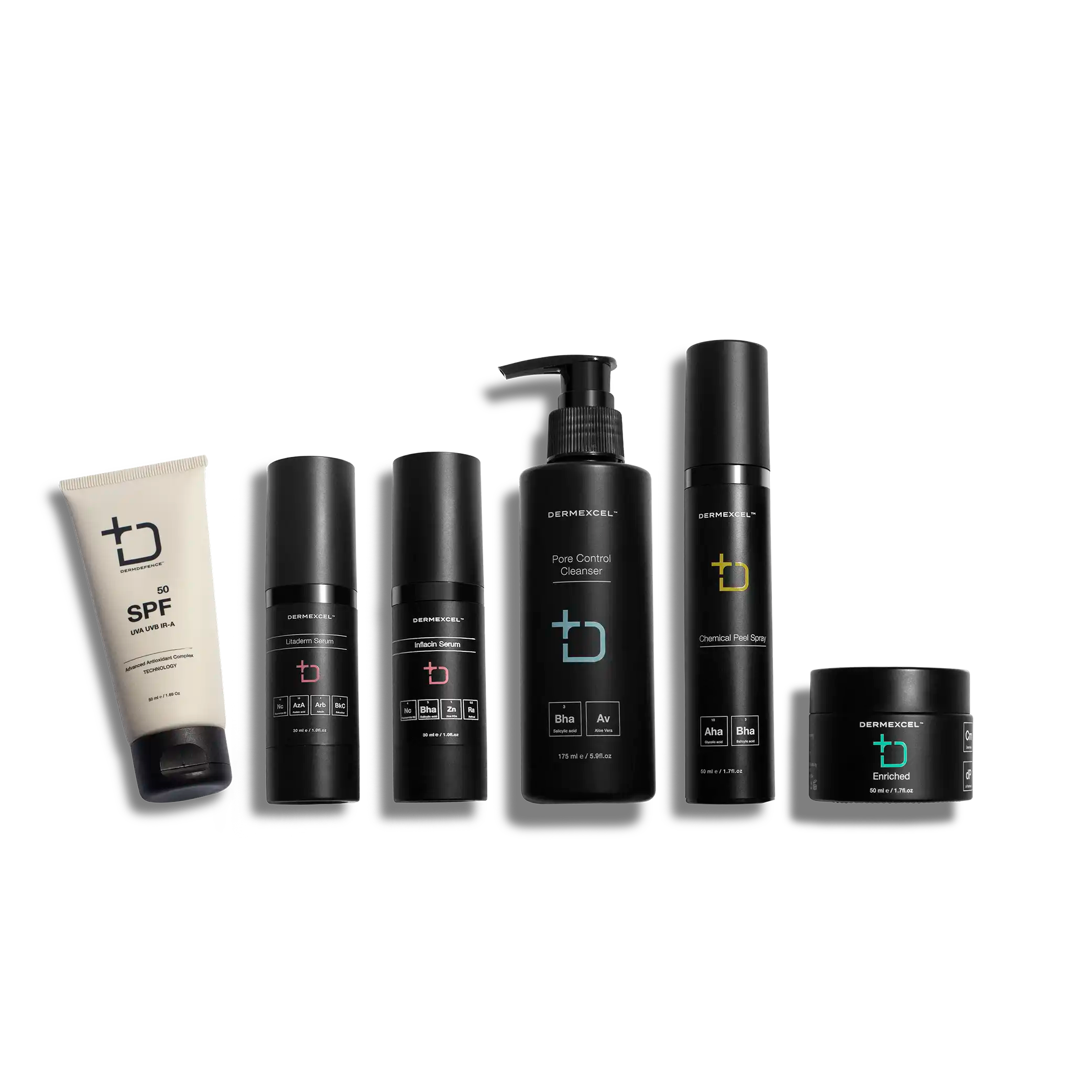
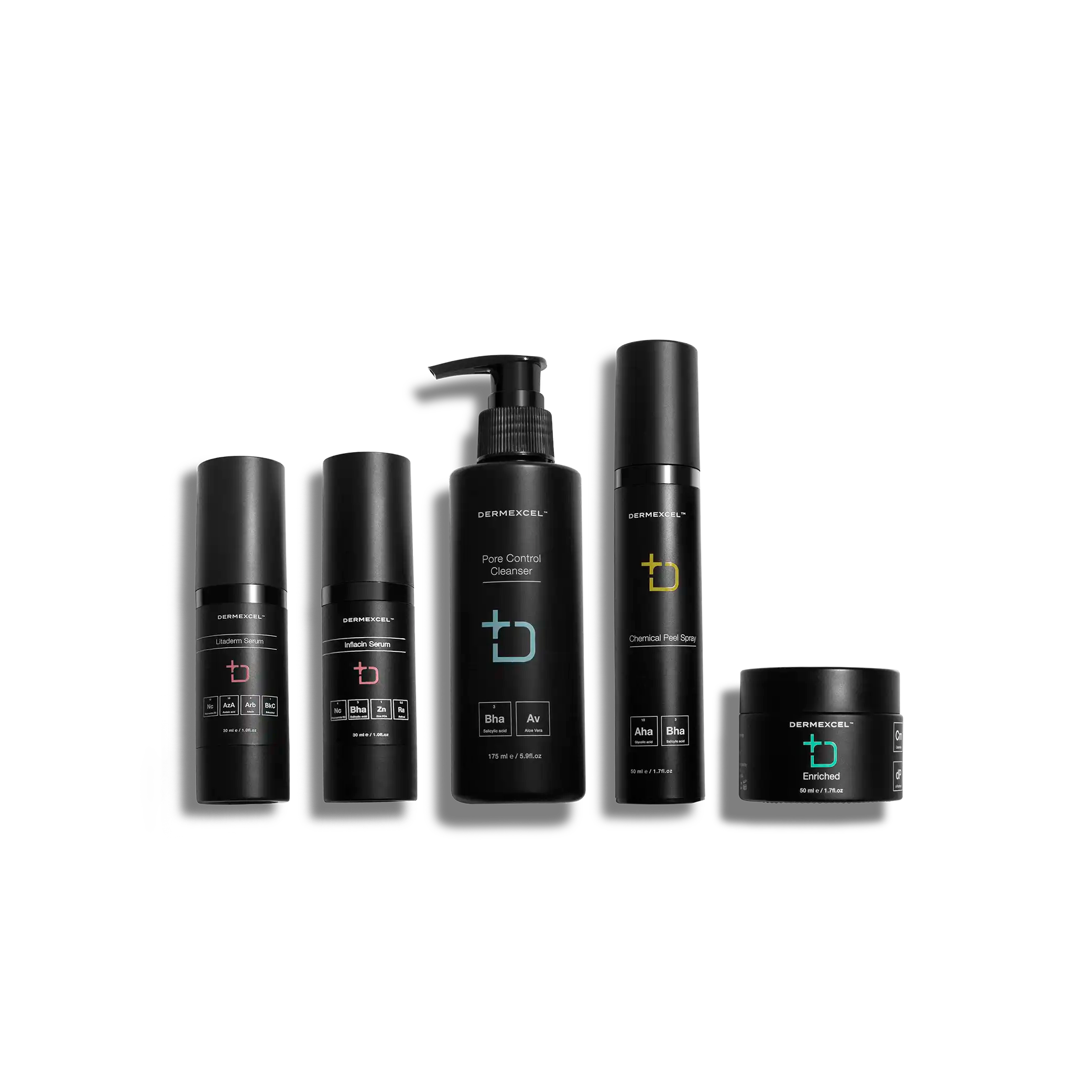
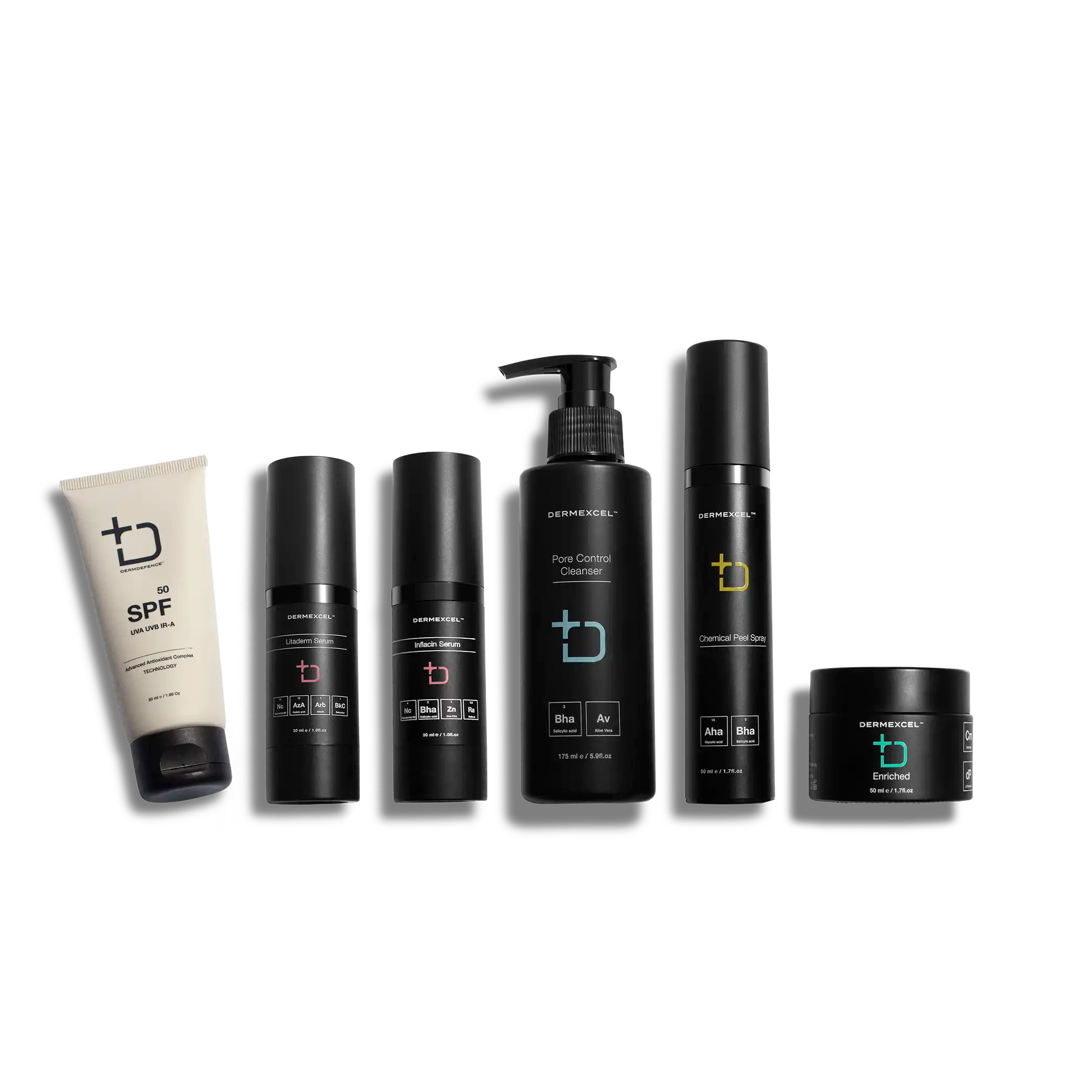
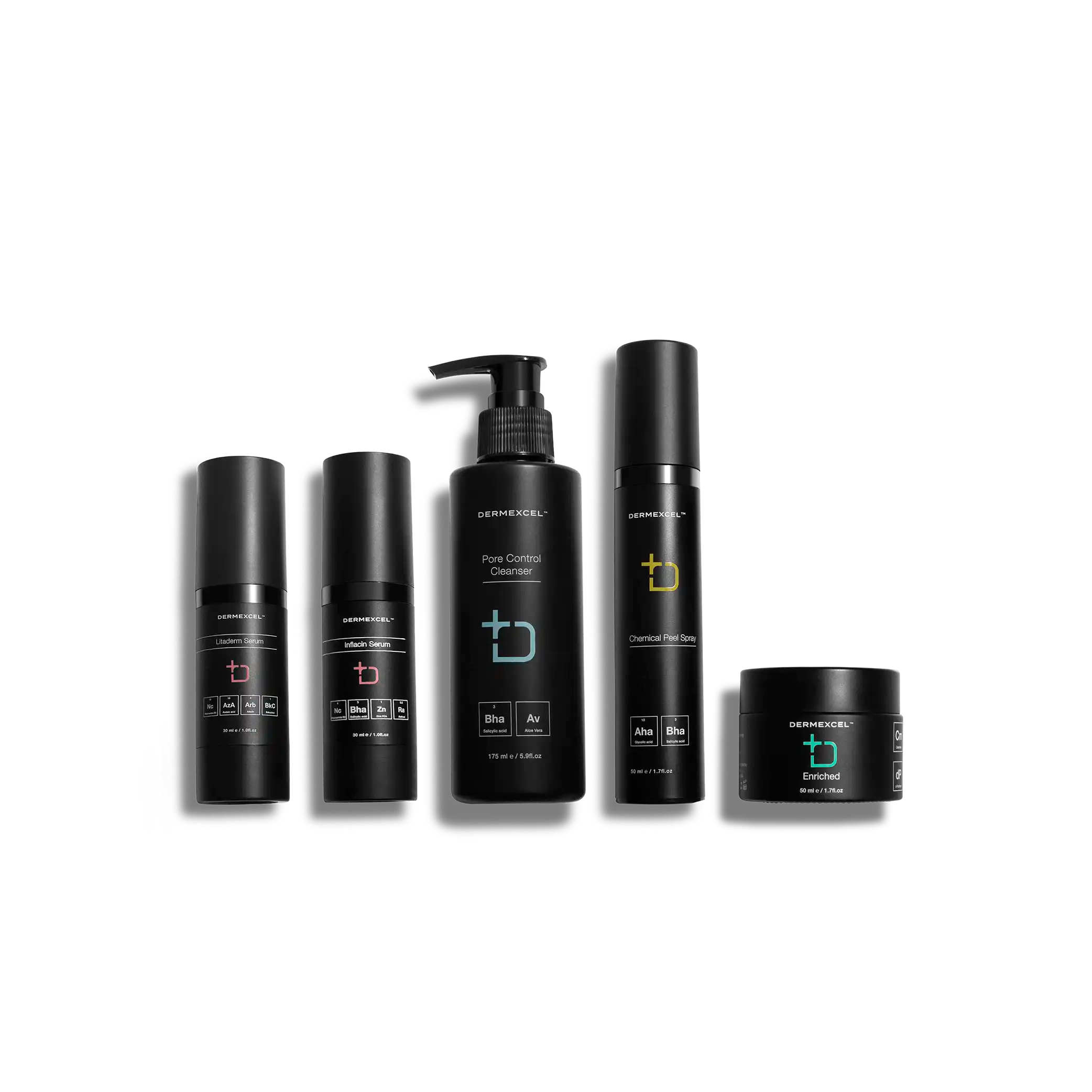




Treatment pack for Dermal Diagnosis: Aging.Dry.Breakouts during pregnancy

Anti-Aging

smooth skin

Anti-Acne

Anti-microbial

Barrier repair

Choose options




Treatment pack for Dermal Diagnosis: Aging.Dry.Breakouts during pregnancy
Aging . Dry . Breakouts during pregnancy
products in your treatment pack
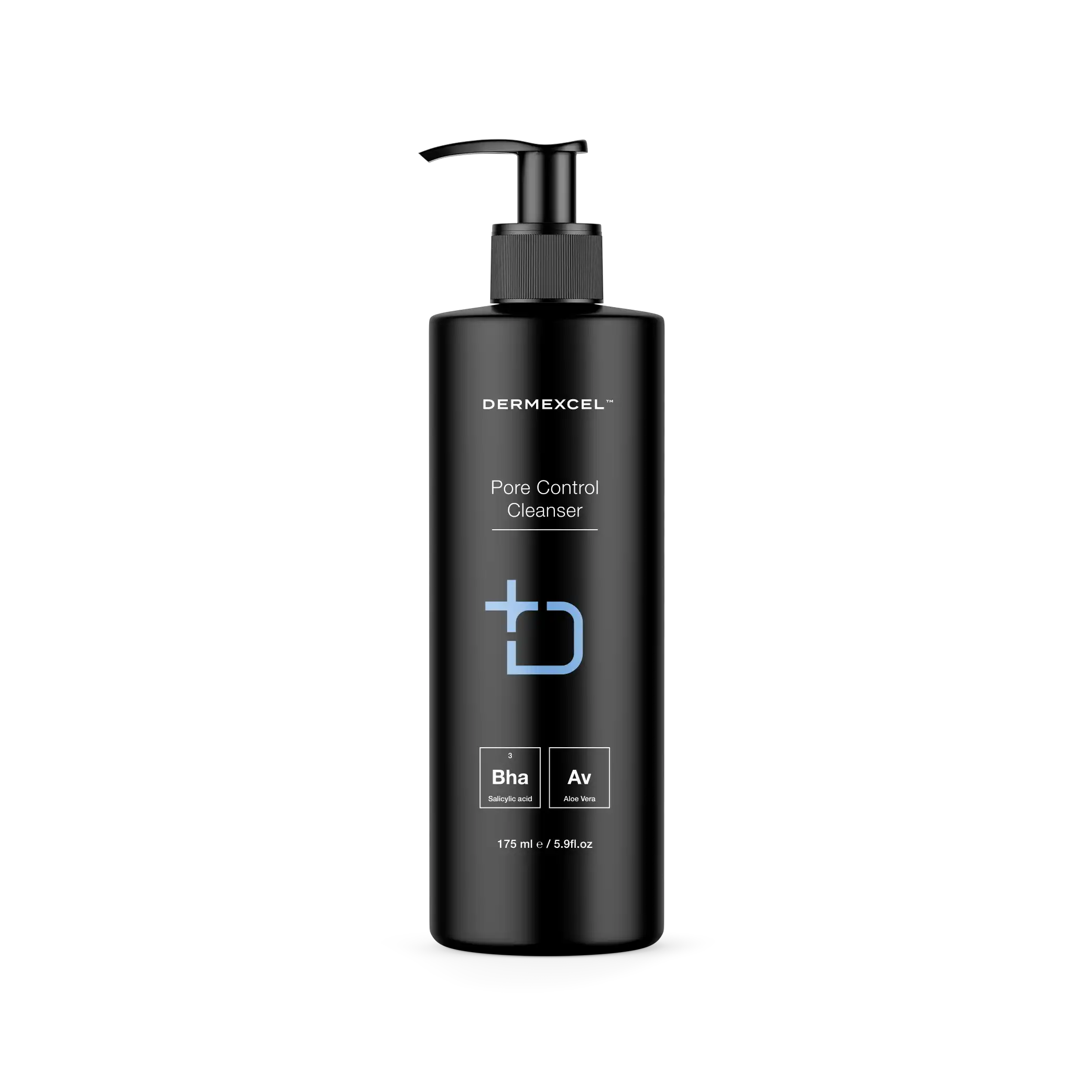
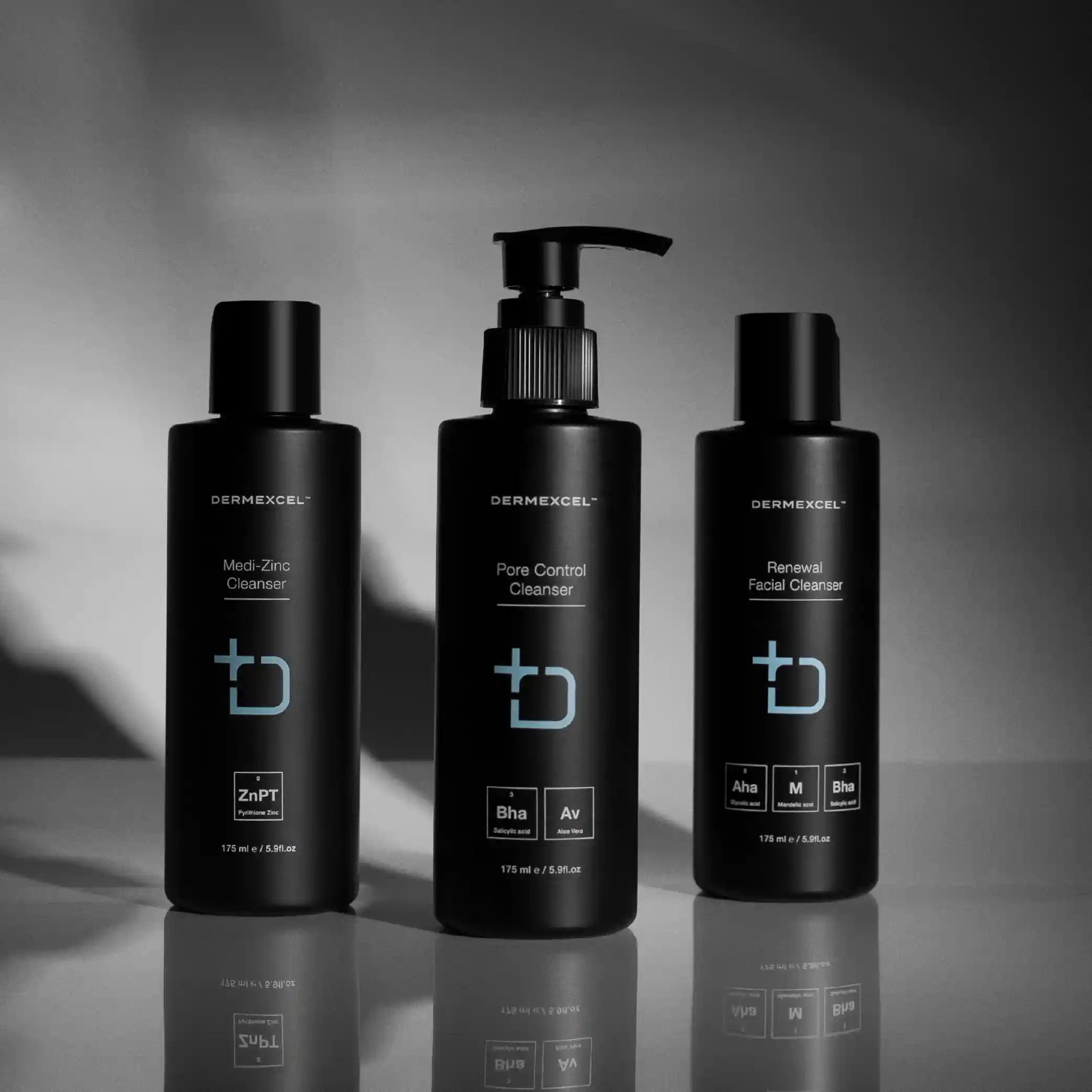
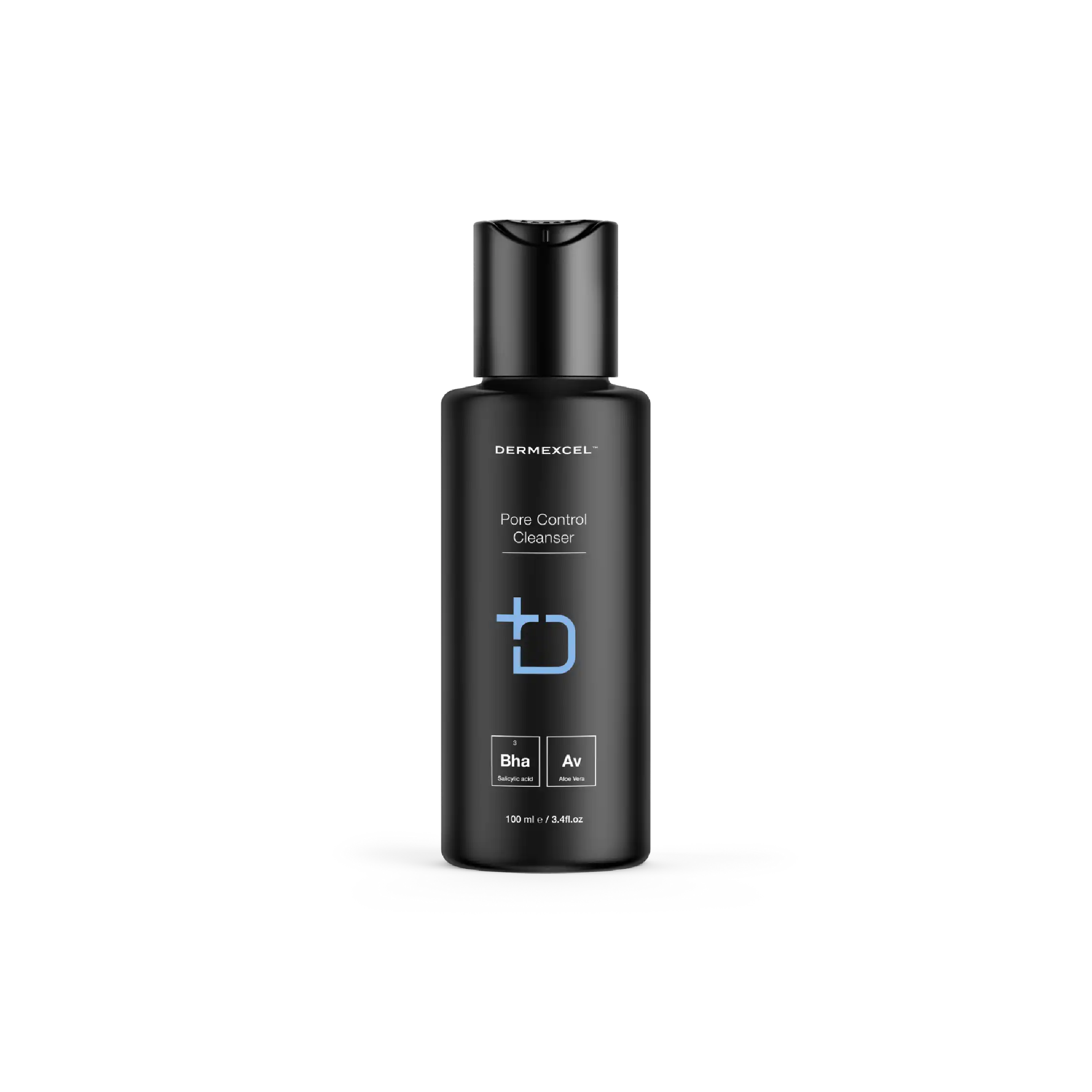





Unclog Pores

Minimize Pores

Anti-Acne

anti-redness

↓ inflammation
Salicylic acid
Salicylic acid, a renowned beta hydroxy acid (BHA), is a cornerstone in dermatology and skincare due to its exceptional keratolytic and comedolytic properties. Its unique ability to penetrate oil-laden hair follicle pores makes it particularly effective in treating acne-prone and oily skin types.
Salicylic acid dissolves skin debris (sebum and dead skin cells) that clogs pores and causes acne. It's a mild antibacterial and powerful anti-inflammatory agent that helps reduce the redness and swelling associated with breakouts.
What sets salicylic acid apart in dermatological treatments is its ability to exfoliate the skin, not just on the surface but within the pores themselves. This is due to its oil-soluble nature, which allows it to penetrate deep into the pores and dissolve the keratin plugs that lead to blackheads and whiteheads.
Furthermore, salicylic acid also has the capacity to adjust the pH of the skin, creating an environment less favorable for the growth of acne-causing bacteria. Salicylic acid's efficacy in treating various skin conditions, particularly acne, has been extensively documented in the scientific literature. Studies have consistently shown its ability to reduce acne lesions in terms of count and severity. Additionally, salicylic acid is highly recommended for its effectiveness in treating other skin conditions, such as psoriasis and dandruff, due to its ability to soften and remove scales and flakes from the skin.
Physiological Effects
- Keratolytic Action: Salicylic acid is known for its ability to exfoliate the skin by dissolving the intercellular 'glue' that holds skin cells together, helping to remove dead skin cells and unclog pores.
- Comedolytic Effect: It is particularly effective in reducing comedones (blackheads and whiteheads) by unclogging pores and preventing the formation of new comedones.
- Anti-inflammatory Properties: Salicylic acid reduces inflammation, which is beneficial in treating acne and other inflammatory skin conditions.
- Sebum Regulation: It helps to regulate oil production, making it a valuable ingredient for managing oily and acne-prone skin.
- Penetration Enhancement: Due to its lipophilic nature, it can penetrate sebum-filled follicles, effectively treating acne located deep within the pores.
Managing Dermatological Conditions
- Acne Vulgaris: Salicylic acid is a cornerstone in acne treatment, effectively preventing and treating existing acne lesions.
- Psoriasis: Its keratolytic properties make it helpful in softening and removing scales associated with psoriasis.
- Warts: Salicylic acid is commonly used to treat warts because it can exfoliate and remove thick skin.
- Seborrheic Dermatitis: It helps manage seborrheic dermatitis by reducing scaling and redness.
- Keratosis Pilaris: Salicylic acid can aid in smoothing the rough bumps associated with peratosis Pilaris.
References
- Zaenglein, A. L., Pathy, A. L., Schlosser, B. J., Alikhan, A., Baldwin, H. E., Berson, D. S., & Thiboutot, D. M. (2016). Guidelines of care for the management of acne vulgaris. Journal of the American Academy of Dermatology, 74(5), 945-973.e33.
- Kornhauser, A., Coelho, S. G., & Hearing, V. J. (2010). Applications of hydroxy acids: classification, mechanisms, and photoactivity. Clinical, cosmetic and investigational dermatology, 3, 135.
- Zander, E., & Weisman, S. (1992). Treatment of acne vulgaris with salicylic acid pads. Clinical Therapeutics.
- Gupta, A. K., & Nicol, K. (2004). The use of sulfur in dermatology. Journal of Drugs in Dermatology.
Aloe Vera
Aloe vera is well-regarded for its medicinal applications and has been a staple in skincare and health for centuries. It’s rich in vitamins, enzymes, minerals, and amino acids, contributing to its many skin benefits.
Aloe vera contains polysaccharides, which are crucial in its moisturizing and anti-inflammatory properties. These polysaccharides help bind moisture to the skin, making aloe vera an excellent hydrating agent for dry and damaged skin.
One of the key benefits of aloe vera is its soothing and healing properties, particularly beneficial for burns, abrasions, and skin irritations. It has been shown to accelerate the healing of minor burns and reduce skin inflammation. Various studies have supported its effectiveness in treating first- and second-degree burns, highlighting its role in enhancing collagen synthesis and skin regeneration.
Aloe vera's anti-inflammatory properties are attributed to compounds like glycoproteins and polysaccharides. These compounds help reduce pain and swelling associated with skin irritations and wounds. Aloe vera also contains aloin and emodin, which provide analgesic, antibacterial, and antiviral properties, further extending its therapeutic potential.
Aloe Vera has numerous physiological effects on the skin due to its rich composition of vitamins, enzymes, minerals, and amino acids. The presence of antioxidants such as vitamins C and E, along with beta-carotene, contributes to its anti-aging benefits, helping to improve skin firmness and keep the skin hydrated.
Physiological Effects
- Moisturizing and Hydrating: Aloe Vera enhances skin hydration, making it effective for dry and dehydrated skin. Its mucopolysaccharides help to bind moisture into the skin.
- Wound Healing: It accelerates wound healing by enhancing collagen synthesis and cross-linking. This effect is particularly useful in healing burns, abrasions, and cuts.
- Anti-inflammatory Properties: Aloe Vera contains compounds like aloin and anthraquinones that have anti-inflammatory properties, making it beneficial in reducing skin inflammation.
- Antimicrobial Activity: It possesses antimicrobial properties, which help in preventing infections in wounds and burns.
- Antioxidant Properties: The presence of vitamins C and E and beta-carotene provides it with antioxidant properties, which can help protect the skin from free radical damage.
- Soothing Effect: Aloe Vera is known for its soothing effects on the skin, particularly in conditions like sunburn.
Managing Dermatological Conditions
- Burns and Wound Care: Aloe Vera's wound-healing and soothing properties make it effective in treating burns, including sunburns and minor skin abrasions.
- Acne Treatment: Due to its antimicrobial and anti-inflammatory properties, it can help treat acne.
- Eczema and Psoriasis: Its moisturizing, anti-inflammatory, and soothing properties are beneficial in managing symptoms of eczema and psoriasis.
- Aging Skin: Aloe Vera's antioxidant properties and ability to improve collagen production can help reduce the signs of aging.
- Skin Hydration: It's a common ingredient in moisturizers and other skin care products for its hydrating properties.
References
- Surjushe, A., Vasani, R., & Saple, D. G. (2008). Aloe vera: A short review. Indian Journal of Dermatology.
- Maenthaisong, R., Chaiyakunapruk, N., Niruntraporn, S., & Kongkaew, C. (2007). The efficacy of aloe vera used for burn wound healing: A systematic review. Burns.
- Rajeswari, R., Umadevi, M., Rahale, C. S., Pushpa, R., Selvavenkadesh, S., Kumar, K. S., & Bhowmik, D. (2012). Aloe vera: The miracle plant its medicinal and traditional uses in India. Journal of Pharmacognosy and Phytochemistry.
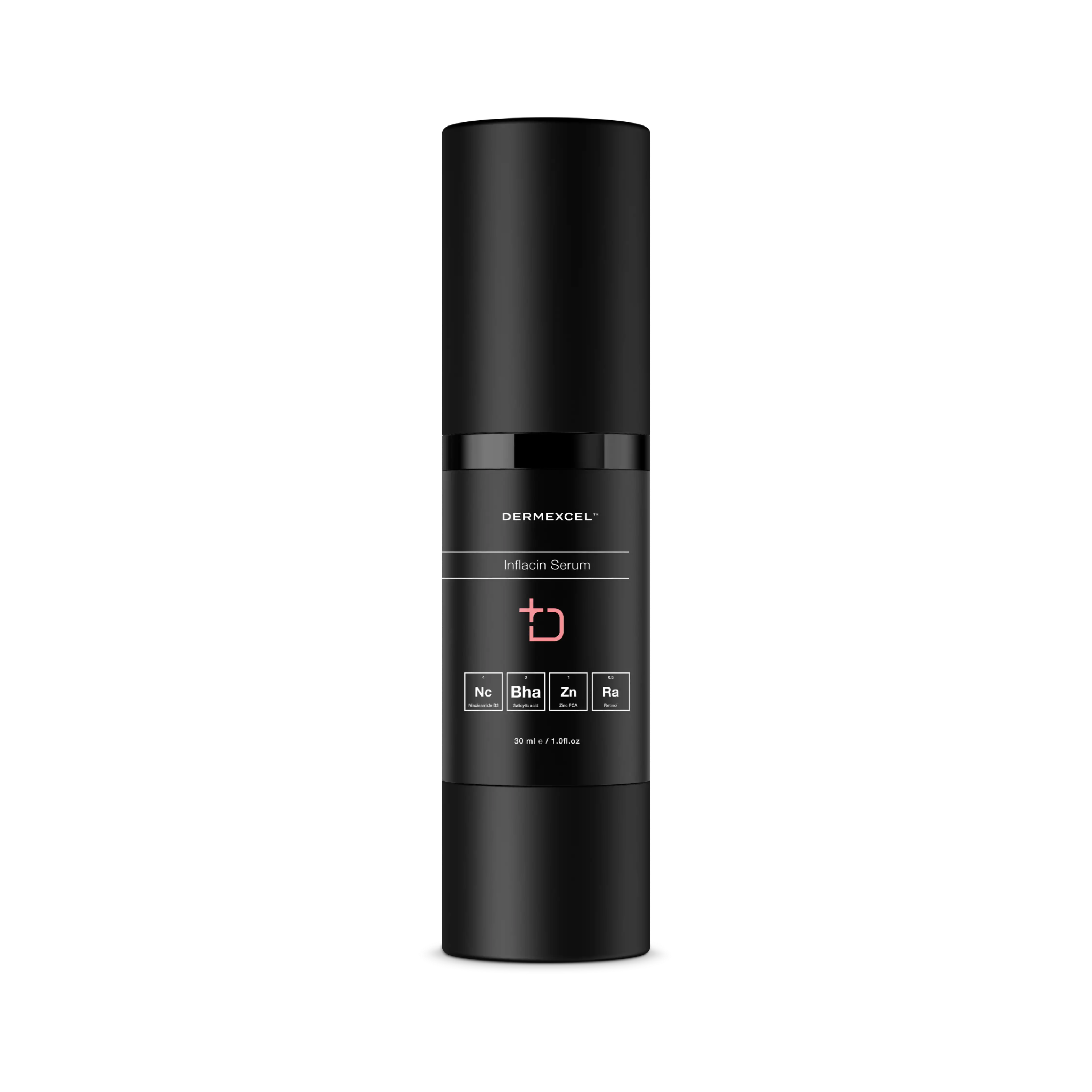
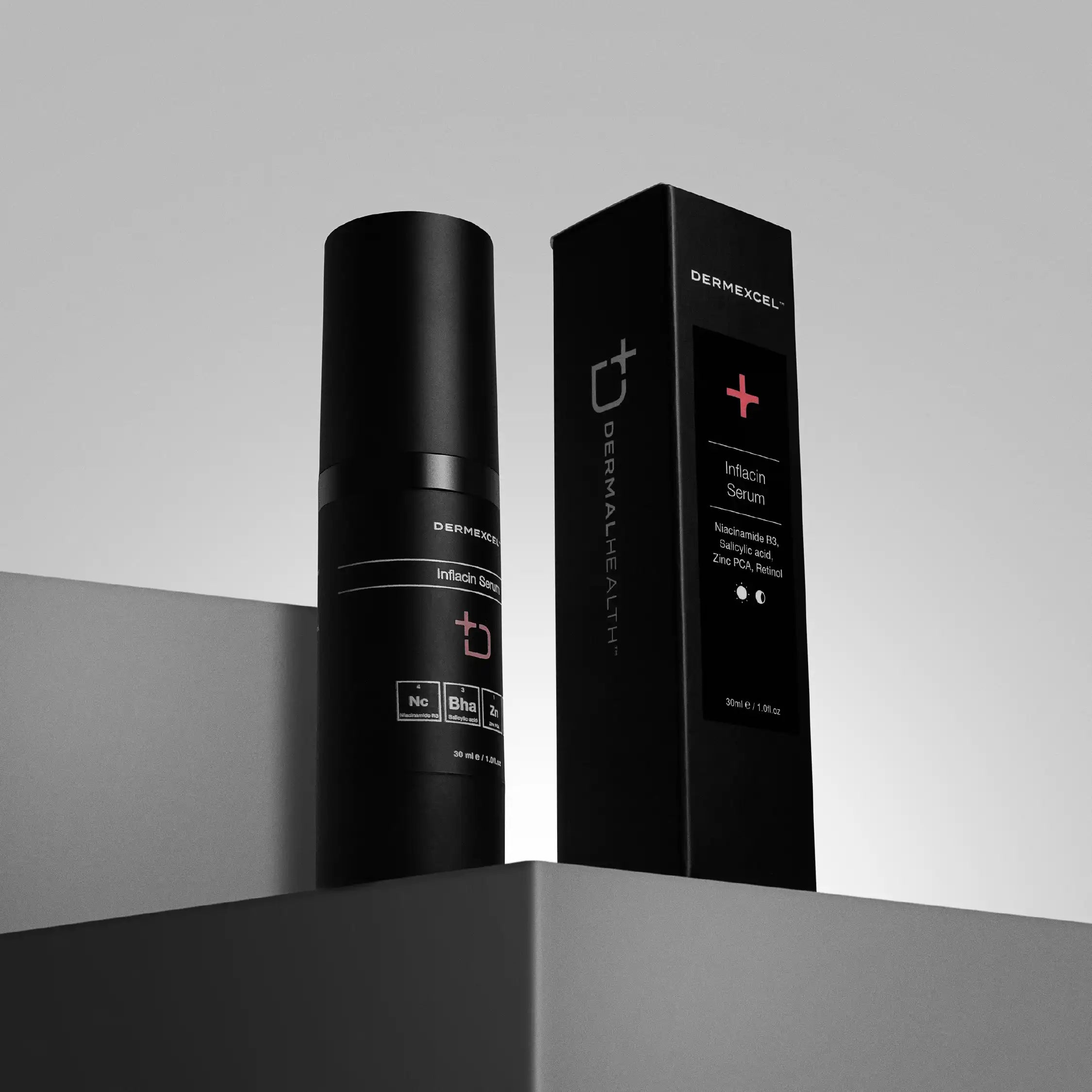




SIZE: 30 mL

Unclog Pores

↓ Sebum

Anti-Acne

↓ inflammation

anti-aging
Niacinamide
Niacinamide offers several benefits for the skin, primarily due to its anti-inflammatory and antioxidant properties. It reduces the redness and inflammation associated with acne, rosacea, and other inflammatory skin conditions. Additionally, niacinamide's ability to improve the skin's barrier function benefits all skin types, particularly those with eczema or mature skin.
Another significant benefit of niacinamide is its role in reducing hyperpigmentation. Studies have shown that it can decrease the transfer of melanin to the epidermis, helping to fade dark spots and even out skin tone.
Niacinamide also plays a role in reducing the visible signs of aging. It has been found to stimulate collagen production and improve skin elasticity, reducing fine lines and wrinkles. Its antioxidant properties further protect the skin from environmental damage, such as pollution and UV radiation, which contribute to premature aging.
The efficacy of niacinamide and its ability to address multiple skin concerns simultaneously has led to its growing popularity in both over-the-counter and prescription skincare formulations.
Physiological Effects
- Barrier Function Enhancement: Niacinamide helps strengthen the skin’s barrier function by increasing the production of ceramides, lipids that keep the skin hydrated and protect against environmental damage.
- Anti-inflammatory Properties: It has notable anti-inflammatory effects, which are beneficial in reducing redness and inflammation associated with acne, eczema, and other inflammatory skin conditions.
- Sebum Regulation: Niacinamide helps regulate sebum production, which controls excess oiliness and can benefit acne-prone skin.
- Hyperpigmentation Reduction: It reduces hyperpigmentation by inhibiting melanosome transfer from melanocytes to keratinocytes, leading to an even skin tone.
- Anti-aging Effects: Niacinamide helps reduce the appearance of fine lines and wrinkles by boosting collagen production and improving skin elasticity.
- Antioxidant Activity: It has antioxidant properties, protecting the skin from oxidative stress and environmental aggressors like UV radiation and pollution.
Managing Dermatological Conditions
- Acne and Oily Skin: Niacinamide effectively manages acne and oily skin by regulating sebum and reducing inflammation.
- Hyperpigmentation and Melasma: Its ability to reduce melanin transfer benefits it in treating hyperpigmentation and melasma.
- Aging Skin: Niacinamide targets wrinkles and loss of firmness.
- Skin Barrier Disorders: Niacinamide is beneficial in treating skin barrier disorders like atopic dermatitis and eczema by enhancing barrier function and hydration.
- Photodamage and Skin Protection: It helps mitigate the effects of photodamage and provides some degree of protection against environmental damage.
References
- Gehring, W. (2004). Nicotinic acid/niacinamide and the skin. Journal of Cosmetic Dermatology.
- Bissett, D. L., Oblong, J. E., & Berge, C. A. (2005). Niacinamide: A B vitamin that improves aging facial skin appearance. Dermatologic Surgery.
- Snaidr, V. A., Damian, D. L., & Halliday, G. M. (2019). Nicotinamide for photoprotection and skin cancer chemoprevention: A review of efficacy and safety. Experimental Dermatology.
- Navarrete-Solís, J. et al. (2011). A Double-Blind, Randomized Clinical Trial of Niacinamide 4% versus Hydroquinone 4% in the Treatment of Melasma. Dermatology Research and Practice, 2011.
Salicylic acid
Salicylic acid, a renowned beta hydroxy acid (BHA), is a cornerstone in dermatology and skincare due to its exceptional keratolytic and comedolytic properties. Its unique ability to penetrate oil-laden hair follicle pores makes it particularly effective in treating acne-prone and oily skin types.
Salicylic acid dissolves skin debris (sebum and dead skin cells) that clogs pores and causes acne. It's a mild antibacterial and powerful anti-inflammatory agent that helps reduce the redness and swelling associated with breakouts.
What sets salicylic acid apart in dermatological treatments is its ability to exfoliate the skin, not just on the surface but within the pores themselves. This is due to its oil-soluble nature, which allows it to penetrate deep into the pores and dissolve the keratin plugs that lead to blackheads and whiteheads.
Furthermore, salicylic acid also has the capacity to adjust the pH of the skin, creating an environment less favorable for the growth of acne-causing bacteria. Salicylic acid's efficacy in treating various skin conditions, particularly acne, has been extensively documented in the scientific literature. Studies have consistently shown its ability to reduce acne lesions in terms of count and severity. Additionally, salicylic acid is highly recommended for its effectiveness in treating other skin conditions, such as psoriasis and dandruff, due to its ability to soften and remove scales and flakes from the skin.
Physiological Effects
- Keratolytic Action: Salicylic acid is known for its ability to exfoliate the skin by dissolving the intercellular 'glue' that holds skin cells together, helping to remove dead skin cells and unclog pores.
- Comedolytic Effect: It is particularly effective in reducing comedones (blackheads and whiteheads) by unclogging pores and preventing the formation of new comedones.
- Anti-inflammatory Properties: Salicylic acid reduces inflammation, which is beneficial in treating acne and other inflammatory skin conditions.
- Sebum Regulation: It helps to regulate oil production, making it a valuable ingredient for managing oily and acne-prone skin.
- Penetration Enhancement: Due to its lipophilic nature, it can penetrate sebum-filled follicles, effectively treating acne located deep within the pores.
Managing Dermatological Conditions
- Acne Vulgaris: Salicylic acid is a cornerstone in acne treatment, effectively preventing and treating existing acne lesions.
- Psoriasis: Its keratolytic properties make it helpful in softening and removing scales associated with psoriasis.
- Warts: Salicylic acid is commonly used to treat warts because it can exfoliate and remove thick skin.
- Seborrheic Dermatitis: It helps manage seborrheic dermatitis by reducing scaling and redness.
- Keratosis Pilaris: Salicylic acid can aid in smoothing the rough bumps associated with peratosis Pilaris.
References
- Zaenglein, A. L., Pathy, A. L., Schlosser, B. J., Alikhan, A., Baldwin, H. E., Berson, D. S., & Thiboutot, D. M. (2016). Guidelines of care for the management of acne vulgaris. Journal of the American Academy of Dermatology, 74(5), 945-973.e33.
- Kornhauser, A., Coelho, S. G., & Hearing, V. J. (2010). Applications of hydroxy acids: classification, mechanisms, and photoactivity. Clinical, cosmetic and investigational dermatology, 3, 135.
- Zander, E., & Weisman, S. (1992). Treatment of acne vulgaris with salicylic acid pads. Clinical Therapeutics.
- Gupta, A. K., & Nicol, K. (2004). The use of sulfur in dermatology. Journal of Drugs in Dermatology.
Zinc PCA
Zinc PCA, also known as Zinc Pyrrolidone Carboxylic Acid, is a skin care ingredient that combines the mineral zinc with a hydrating molecule PCA (Pyrrolidone Carboxylic Acid). It is renowned for its numerous benefits in skincare, particularly for its anti-inflammatory, antimicrobial, and sebum-regulating properties.
Zinc PCA is derived from zinc, an essential mineral known for its antioxidant and skin-soothing capabilities. Zinc is also noted for its role in wound healing and its ability to reduce inflammation, which can be particularly beneficial for acne-prone and irritated skin. The PCA component is a natural moisturizing factor (NMF) found in the skin, which helps maintain the skin's hydration levels.
One of the key benefits of Zinc PCA is its ability to regulate sebum production. Excess sebum can lead to acne and oily skin, and Zinc PCA helps to moderate this by inhibiting the activity of the enzyme 5-alpha reductase, which is involved in oil production. This makes it an effective ingredient in formulations targeting oily and acne-prone skin (Schueller, R. and Romanowski, P., 2003).
In addition to its sebum-regulating properties, Zinc PCA possesses antimicrobial properties, which further contribute to its efficacy in treating acne. By reducing the presence of acne-causing bacteria on the skin, it helps to prevent and reduce acne breakouts.
Moreover, Zinc PCA's anti-inflammatory properties make it beneficial for soothing irritated skin and reducing redness and inflammation associated with various skin conditions, including acne, rosacea, and eczema.
Physiological Effects
- Sebum Regulation: Zinc PCA reduce and regulate sebum secretion and production, making it beneficial for oily and acne-prone skin by controlling excess oil production.
- Antimicrobial Action: Zinc has antimicrobial properties, particularly effective against acne-causing bacteria, reducing acne breakouts.
- Anti-inflammatory Effects: Zinc PCA reduces inflammation, which is beneficial in treating inflammatory skin conditions like acne and rosacea.
- Moisture Retention: PCA is a natural moisturizing factor (NMF) that helps maintain skin hydration, enhancing the skin’s moisture retention capabilities.
- Wound Healing: Zinc is essential for wound healing processes, aiding in the repair and regeneration of skin tissues.
Managing Dermatological Conditions
- Acne Management: Its ability to regulate sebum production and provide antimicrobial action makes Zinc PCA a valuable ingredient in acne treatments.
- Oily Skin: It's beneficial in controlling excess oiliness and maintaining a balanced skin environment.
- Sensitive Skin Conditions: Due to its anti-inflammatory properties, Zinc PCA soothes sensitive skin and conditions like rosacea.
- Skin Hydration: Its role as an NMF helps in maintaining skin hydration, useful in treating dry skin conditions.
References
- Schagen, S. K., et al. (2012). Discovering the link between nutrition and skin aging. Dermato-endocrinology.
- Firooz, A., et al. (2011). Zinc therapy in dermatology: a review. Dermatology Research and Practice.
- Gupta, M., et al. (2014). Zinc therapy in dermatology. Indian Dermatology Online Journal.
- Schueller, R. and Romanowski, P. (2003). Conditioning Agents for Hair and Skin. Cosmetic Science and Technology Series. Marcel Dekker Inc., New York, USA.
Retinoic acid analogue
Retinoic acid, often referred to as tretinoin in its pharmaceutical form, is the active form of Vitamin A. It is widely recognized for its powerful effects in dermatology and skin care, particularly in treating acne and signs of skin aging.
Retinoic acid works at the cellular level to modify gene expression and affect cell growth. In treating acne, it promotes the turnover of skin cells, reducing the likelihood of pore-clogging and helping to clear existing breakouts. Additionally, it decreases the cohesiveness of follicular epithelial cells, further preventing the formation of comedones.
Retinoic acid's ability to stimulate collagen production is a key benefit in anti-aging skincare. This leads to a reduction in fine lines and wrinkles and an improvement in overall skin texture and tone. It also aids skin discoloration and hyperpigmentation by accelerating cell turnover, bringing new skin cells to the surface faster, and shedding pigmented and damaged cells.
Despite its benefits, retinoic acid can irritate the skin, causing side effects like redness, dryness, and peeling, especially during the initial period of use. Its potency means it is generally available by prescription and requires careful monitoring by a healthcare professional.
Hydroxypinacolone Retinoate (HPR) is a newer, esterified form of retinoic acid. Unlike cosmetic retinol, HPR binds directly to the retinoid receptors of the skin cells without needing conversion. This direct binding allows it to deliver similar benefits to retinoic acid, such as stimulating collagen production, improving skin elasticity, and reducing signs of aging, but with a lower risk of irritation.
HPR is considered more gentle and less irritating than traditional retinoic acid while offering comparable benefits. With HPR, everyone has access to the benefits of prescription retinoids without the risk of side effects.
Physiological Effects
- Cell Turnover and Renewal: HPR promotes rapid cell turnover, aiding in the exfoliation of dead skin cells and generating new cells.
- Skin Texture: Promoting cell renewal improves skin texture and addresses issues like roughness and dullness.
- Collagen Production: It stimulates collagen production, which is essential for reducing the appearance of fine lines and wrinkles and improving skin elasticity.
- Acne Treatment: Effective in treating acne by unclogging pores and reducing the size of sebaceous glands, it diminishes both inflammatory and non-inflammatory acne lesions.
- Pigmentation: It can reduce hyperpigmentation by accelerating the turnover of hyperpigmented skin cells and inhibiting melanin production.
- Photoaging: Effective in treating signs of photoaging, reversing some of the damage caused by UV radiation.
Special Benefits
- Retinoid Receptor Activity: HPR, an ester of retinoic acid, binds directly to retinoid receptors in the skin, enabling it to work without needing to be converted into retinoic acid.
- Lower Irritation: Typically, it causes less irritation than retinoic acid, making it more suitable for sensitive skin types.
- Collagen Stimulation and Anti-Aging: Like retinoic acid, HPR helps in stimulating collagen production and has anti-aging properties.
- Acne and Hyperpigmentation: It effectively treats acne and reduces hyperpigmentation, often with fewer side effects than retinoic acid.
- Stability and Penetration: HPR is more stable and lipid-soluble, so it penetrates the skin more effectively and is less prone to degradation.
References
- Zaenglein, A. L., Pathy, A. L., Schlosser, B. J., Alikhan, A., Baldwin, H. E., Berson, D. S., ... & Thiboutot, D. M. (2016). Guidelines of care for the management of acne vulgaris. Journal of the American Academy of Dermatology, 74(5), 945-973.e33.
- Fisher, G. J., Wang, Z. Q., Datta, S. C., Varani, J., Kang, S., & Voorhees, J. J. (1996). Pathophysiology of premature skin aging induced by ultraviolet light. New England Journal of Medicine, 337(20), 1419-1428.
- Truchuelo, M. T., Jiménez, N., Jaén, P. (2018). Assessment of the efficacy of a new complex-based retinoic acid and retinol in a 3-month study using objective methods and skin biomarker analysis. Journal of Cosmetic Dermatology, 17(3), 347-354.
- Mukherjee, S., et al. (2006). Retinoids in the treatment of skin aging: an overview of clinical efficacy and safety. Clinical Interventions in Aging.
- Randhawa, M., et al. (2015). Hydroxypinacolone retinoate: a new retinoid and its use in dermatology. Skin Therapy Letter.
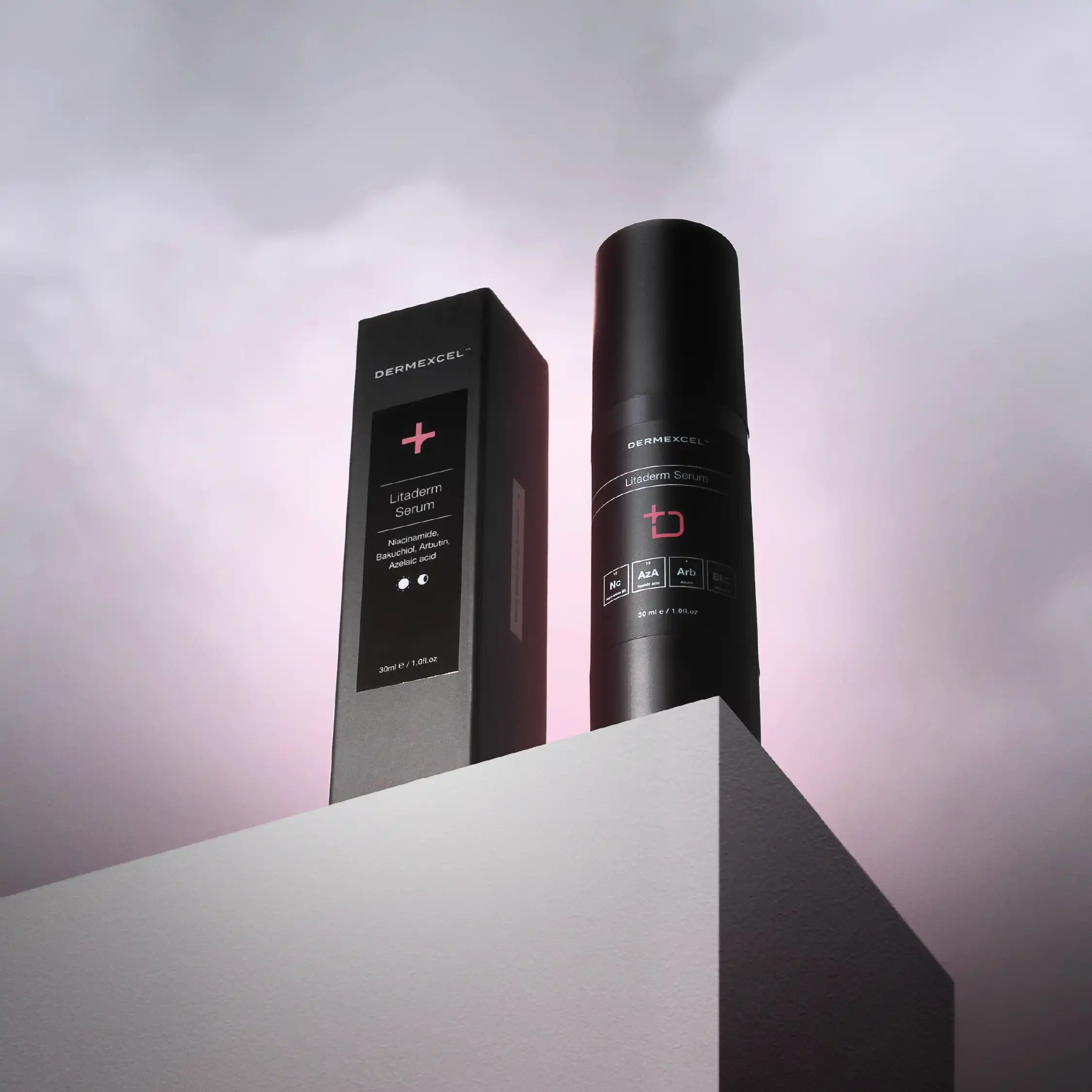




SIZE: 30 mL

Even Skin Tone

Moisturizing

anti-redness

anti-aging

↓ inflammation
Niacinamide
Niacinamide offers several benefits for the skin, primarily due to its anti-inflammatory and antioxidant properties. It reduces the redness and inflammation associated with acne, rosacea, and other inflammatory skin conditions. Additionally, niacinamide's ability to improve the skin's barrier function benefits all skin types, particularly those with eczema or mature skin.
Another significant benefit of niacinamide is its role in reducing hyperpigmentation. Studies have shown that it can decrease the transfer of melanin to the epidermis, helping to fade dark spots and even out skin tone.
Niacinamide also plays a role in reducing the visible signs of aging. It has been found to stimulate collagen production and improve skin elasticity, reducing fine lines and wrinkles. Its antioxidant properties further protect the skin from environmental damage, such as pollution and UV radiation, which contribute to premature aging.
The efficacy of niacinamide and its ability to address multiple skin concerns simultaneously has led to its growing popularity in both over-the-counter and prescription skincare formulations.
Physiological Effects
- Barrier Function Enhancement: Niacinamide helps strengthen the skin’s barrier function by increasing the production of ceramides, lipids that keep the skin hydrated and protect against environmental damage.
- Anti-inflammatory Properties: It has notable anti-inflammatory effects, which are beneficial in reducing redness and inflammation associated with acne, eczema, and other inflammatory skin conditions.
- Sebum Regulation: Niacinamide helps regulate sebum production, which controls excess oiliness and can benefit acne-prone skin.
- Hyperpigmentation Reduction: It reduces hyperpigmentation by inhibiting melanosome transfer from melanocytes to keratinocytes, leading to an even skin tone.
- Anti-aging Effects: Niacinamide helps reduce the appearance of fine lines and wrinkles by boosting collagen production and improving skin elasticity.
- Antioxidant Activity: It has antioxidant properties, protecting the skin from oxidative stress and environmental aggressors like UV radiation and pollution.
Managing Dermatological Conditions
- Acne and Oily Skin: Niacinamide effectively manages acne and oily skin by regulating sebum and reducing inflammation.
- Hyperpigmentation and Melasma: Its ability to reduce melanin transfer benefits it in treating hyperpigmentation and melasma.
- Aging Skin: Niacinamide targets wrinkles and loss of firmness.
- Skin Barrier Disorders: Niacinamide is beneficial in treating skin barrier disorders like atopic dermatitis and eczema by enhancing barrier function and hydration.
- Photodamage and Skin Protection: It helps mitigate the effects of photodamage and provides some degree of protection against environmental damage.
References
- Gehring, W. (2004). Nicotinic acid/niacinamide and the skin. Journal of Cosmetic Dermatology.
- Bissett, D. L., Oblong, J. E., & Berge, C. A. (2005). Niacinamide: A B vitamin that improves aging facial skin appearance. Dermatologic Surgery.
- Snaidr, V. A., Damian, D. L., & Halliday, G. M. (2019). Nicotinamide for photoprotection and skin cancer chemoprevention: A review of efficacy and safety. Experimental Dermatology.
- Navarrete-Solís, J. et al. (2011). A Double-Blind, Randomized Clinical Trial of Niacinamide 4% versus Hydroquinone 4% in the Treatment of Melasma. Dermatology Research and Practice, 2011.
Azelaic acid
Azelaic acid, a naturally occurring dicarboxylic acid, is an effective ingredient in dermatological treatments, particularly for acne, rosacea, and hyperpigmentation, with antimicrobial and anti-inflammatory properties.
Physiological Effects
- Anti-Inflammatory Properties: Azelaic acid reduces inflammation, effectively treating inflammatory skin conditions like acne and rosacea.
- Antimicrobial Action: It possesses antimicrobial properties that target acne-causing bacteria (Propionibacterium acnes), helping to reduce acne outbreaks.
- Keratolytic Effects: It helps unclog pores and reduce the formation of comedones (black and whiteheads) by normalizing the shedding of skin cells.
- Depigmenting Agent: Azelaic acid effectively treats hyperpigmentation disorders, including melasma, as it inhibits tyrosinase, an enzyme involved in melanin production.
Managing Dermatological Conditions
- Acne: Azelaic acid inhibits the proliferation of acne-causing bacteria on the skin’s surface, thereby reducing bacterial growth and inflammation. Its antibacterial activity is primarily against Propionibacterium acnes, a key bacterium involved in the development of acne. Furthermore, azelaic acid helps unclog pores and reduce skin cell buildup, effectively treating mild to moderate acne.
- Rosacea: Azelaic acid's anti-inflammatory action helps to reduce redness and swelling associated with rosacea. In addition, azelaic acid's ability to reduce keratinization (the process by which skin cells become more fibrous and less flexible) contributes to its effectiveness in this condition.
- Pigmentation: Azelaic acid effectively treats melasma and post-inflammatory hyperpigmentation by inhibiting tyrosinase, an enzyme in melanin production. This helps to reduce the formation of excess pigment and can lead to a more even skin tone.
References
- Fitton, A., & Goa, K. L. (1991). Azelaic Acid. Drugs.
- Gollnick, H., & Schramm, M. (1998). Topical drug treatment in acne. Dermatology.
- Passeron, T., et al. (2019). Melasma treatment: A novel approach using a topical agent that contains an anti-estrogen and a low-dose retinoid. G Ital Dermatol Venereol.
- Wolf, J. E., Kerrouche, N., & Arsonnaud, S. (2006). Efficacy and safety of once-daily metronidazole 1% gel compared with twice-daily azelaic acid 15% gel in the treatment of rosacea. Cutis, 77(4 Suppl), 3-11.
- Hollinger, J. C., Angra, K., & Halder, R. M. (2018). Are natural ingredients effective in the management of hyperpigmentation? A systematic review. The Journal of clinical and aesthetic dermatology, 11(2), 28.
Alpha Arbutin
Alpha Arbutin is a derivative of hydroquinone and a biosynthetic active ingredient. Its primary action is inhibiting tyrosinase, a key enzyme involved in the synthesis of melanin, the pigment responsible for skin color. Alpha Arbutin effectively reduces melanin production in the skin by inhibiting tyrosin activity. This gradually lightens hyperpigmented areas, such as age spots, melasma, and scars, resulting in a more even skin tone.
One of the significant advantages of Alpha Arbutin over other skin-lightening agents is its safety profile. Unlike hydroquinone, which has been associated with potential side effects and is restricted in many countries, Alpha Arbutin is considered safe and less irritating to the skin, even at higher concentrations. This makes it a suitable ingredient for all skin types, including sensitive skin.
In addition to its skin-lightening properties, Alpha Arbutin has also shown antioxidant effects, helping to protect the skin from oxidative stress caused by environmental factors like UV radiation and pollution.
Physiological Effects
- Melanin Inhibition: Alpha Arbutin works by inhibiting tyrosinase, the enzyme responsible for melanin production in the skin. This action reduces the formation of melanin, leading to a lightening of skin pigmentation.
- Even Skin Tone: Regular use of alpha arbutin can lead to a more even skin tone overall, reducing the appearance of age spots and hyperpigmentation.
- Reduced Skin Discoloration: It effectively reduces the appearance of dark spots and areas of hyperpigmentation, such as those caused by acne, sun damage, or hormonal changes.
- Safer Alternative to Hydroquinone: While structurally similar to hydroquinone, alpha arbutin is a safer option with a lower risk of side effects.
Managing Dermatological Conditions
- Hyperpigmentation: Alpha arbutin treats melasma, sun spots, and post-inflammatory hyperpigmentation from acne.
- Skin Brightening: Provide a more radiant and uniform skin tone.
- Anti-Aging: Reduce the appearance of age-related spots and uneven skin tone.
Bakuchiol
Bakuchiol's mechanism of action is similar to retinol's; it stimulates collagen production and accelerates cell turnover, improving skin texture and tone. It also helps reduce the appearance of fine lines, wrinkles, and hyperpigmentation, making it an effective ingredient in anti-aging skincare products.
One of the key advantages of bakuchiol over traditional retinol is its gentleness on the skin. Retinol is known for potential side effects like dryness, redness, and irritation, particularly in sensitive skin or when used in high concentrations. Bakuchiol, however, is far less irritating. In addition to its anti-aging properties, bakuchiol exhibits antioxidant and anti-inflammatory properties, further contributing to its skin benefits. It helps protect the skin from oxidative stress and can soothe it, reducing redness and inflammation.
Bakuchiol's retinol-like effects and its antioxidant, anti-inflammatory, and antibacterial properties make it an effective ingredient for various skin concerns, especially for those seeking natural alternatives in anti-aging and acne treatment.
Physiological Effects
- Retinol-like Function: Bakuchiol mimics the actions of retinol, stimulating collagen production. This helps reduce the appearance of fine lines and wrinkles and improves skin elasticity.
- Antioxidant Properties: It offers antioxidant benefits, protecting the skin from oxidative stress and damage caused by environmental factors like UV radiation.
- Anti-inflammatory Effects: Bakuchiol has anti-inflammatory properties, which can help soothe the skin and reduce redness and irritation.
- Improved Skin Tone and Texture: Regular use of bakuchiol can improve skin tone and texture, making it smoother and more even.
- Acne Management: Bakuchiol's antibacterial properties and ability to regulate sebum production make it effective in managing acne.
Managing Dermatological Conditions
- Aging Skin: Bakuchiol is popular in anti-aging skincare because it stimulates collagen production and reduces signs of aging.
- Sensitive Skin: As a gentler alternative to retinol, it is suitable for sensitive skin types that cannot tolerate traditional retinoids.
- Acne-Prone Skin: Its antibacterial and anti-inflammatory properties are beneficial in acne treatments.
- Hyperpigmentation: Bakuchiol can help treat hyperpigmentation, enhance skin radiance, and reduce dark spots.
References
- Chaudhuri, R. K., & Bojanowski, K. (2014). Bakuchiol: a retinol-like functional compound revealed by gene expression profiling and clinically proven to have anti-aging effects. International Journal of Cosmetic Science.
- Dhaliwal, S., et al. (2019). Prospective, randomized, double-blind assessment of topical bakuchiol and retinol for facial photoageing. British Journal of Dermatology.
- Sivamani, R. K., et al. (2019). Clinical efficacy of a bakuchiol, niacinamide and zinc pyrithione formulation in facial sebum control and mild acne. Journal of Cosmetic Dermatology.
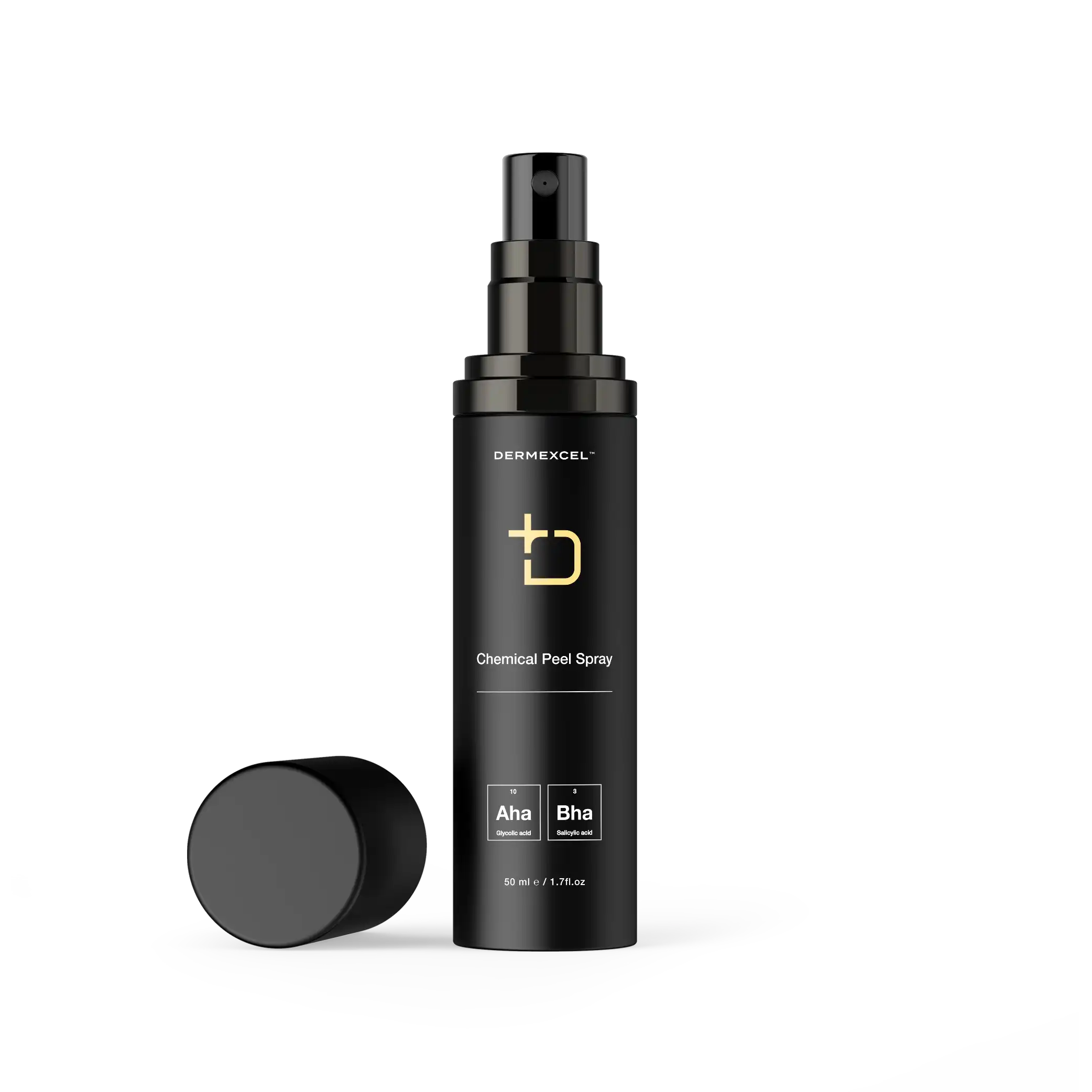





SIZE: 50 mL

Exfoliating

Smooth Skin

Ingrown hair

Anti-Acne

Anti-Aging
Glycolic acid
Glycolic acid is highly acclaimed for its remarkable exfoliating and rejuvenating properties. Its small molecular size enables deep skin penetration, fostering efficient exfoliation at the cellular level.
Glycolic acid’s water solubility allows it to penetrate the upper layers of the skin easily. Its primary mechanism of action involves weakening the bonds between dead skin cells, promoting their shedding, and revealing the newer, healthier skin beneath. This process of accelerated cell turnover is instrumental in addressing a range of skin concerns, from aging signs like fine lines and wrinkles to texture irregularities and hyperpigmentation.
Glycolic acid's efficacy extends beyond mere exfoliation. It's also recognized for stimulating collagen production, a crucial protein in maintaining skin's elasticity and firmness. This aspect contributes to its anti-aging benefits. Furthermore, its hydrating properties add to its appeal, as they help increase the skin's capacity to retain moisture, leading to a more supple and vibrant complexion.
Clinical studies have consistently supported glycolic acid's role in improving skin appearance. Research indicates significant improvements in skin texture and pigmentation and the visible reduction of wrinkles and fine lines with glycolic acid.
Physiological Effects
- Exfoliation: Glycolic acid is a powerful exfoliant. It dissolves the bonds between dead skin cells on the skin’s surface, facilitating their removal and revealing newer, healthier skin underneath.
- Increased Collagen Production: It stimulates collagen production, which is essential for skin elasticity and firmness. This action helps reduce the appearance of fine lines and wrinkles.
- Enhanced Skin Hydration: Glycolic acid improves the skin's ability to retain moisture, enhancing hydration and a more plump, vibrant skin appearance.
- Skin Brightening: Removing dead skin cells can brighten the complexion and reduce the appearance of dark spots and hyperpigmentation.
- Improved Skin Texture: Regular use of glycolic acid can lead to smoother, more even textured skin, making it beneficial for conditions like keratosis pilaris.
- Acne Treatment: Its exfoliating properties help in unclogging pores, thereby reducing the occurrence of acne breakouts.
Managing Dermatological Conditions
- Aging Skin: Glycolic acid is widely used in anti-aging products to reduce signs of aging, such as fine lines, wrinkles, and age spots.
- Acne-Prone Skin: It helps manage acne by exfoliating the skin and removing blockage from pores.
- Hyperpigmentation: It effectively treats hyperpigmentation by accelerating the removal of hyperpigmented skin cells.
- Textural Irregularities: Glycolic acid can improve skin texture and is beneficial for treating keratosis pilaris and other conditions of rough skin.
- Sun-Damaged Skin: It helps rejuvenate sun-damaged skin by accelerating cell turnover and collagen synthesis.
References
- Bernstein, E. F. (2001). Glycolic acid treatment increases type I collagen mRNA and hyaluronic acid content of human skin. Dermatologic Surgery.
- Kornhauser, A., Coelho, S. G., & Hearing, V. J. (2010). Applications of hydroxy acids: classification, mechanisms, and photoactivity. Clinical, Cosmetic and Investigational Dermatology.
- Sharad, J. (2013). Glycolic acid peel therapy – a current review. Clinical, Cosmetic and Investigational Dermatology.
- Smith, W. P. (1996). Epidermal and dermal effects of topical lactic acid. Journal of the American Academy of Dermatology, 35(3), 388-391.
Salicylic acid
Salicylic acid, a renowned beta hydroxy acid (BHA), is a cornerstone in dermatology and skincare due to its exceptional keratolytic and comedolytic properties. Its unique ability to penetrate oil-laden hair follicle pores makes it particularly effective in treating acne-prone and oily skin types.
Salicylic acid dissolves skin debris (sebum and dead skin cells) that clogs pores and causes acne. It's a mild antibacterial and powerful anti-inflammatory agent that helps reduce the redness and swelling associated with breakouts.
What sets salicylic acid apart in dermatological treatments is its ability to exfoliate the skin, not just on the surface but within the pores themselves. This is due to its oil-soluble nature, which allows it to penetrate deep into the pores and dissolve the keratin plugs that lead to blackheads and whiteheads.
Furthermore, salicylic acid also has the capacity to adjust the pH of the skin, creating an environment less favorable for the growth of acne-causing bacteria. Salicylic acid's efficacy in treating various skin conditions, particularly acne, has been extensively documented in the scientific literature. Studies have consistently shown its ability to reduce acne lesions in terms of count and severity. Additionally, salicylic acid is highly recommended for its effectiveness in treating other skin conditions, such as psoriasis and dandruff, due to its ability to soften and remove scales and flakes from the skin.
Physiological Effects
- Keratolytic Action: Salicylic acid is known for its ability to exfoliate the skin by dissolving the intercellular 'glue' that holds skin cells together, helping to remove dead skin cells and unclog pores.
- Comedolytic Effect: It is particularly effective in reducing comedones (blackheads and whiteheads) by unclogging pores and preventing the formation of new comedones.
- Anti-inflammatory Properties: Salicylic acid reduces inflammation, which is beneficial in treating acne and other inflammatory skin conditions.
- Sebum Regulation: It helps to regulate oil production, making it a valuable ingredient for managing oily and acne-prone skin.
- Penetration Enhancement: Due to its lipophilic nature, it can penetrate sebum-filled follicles, effectively treating acne located deep within the pores.
Managing Dermatological Conditions
- Acne Vulgaris: Salicylic acid is a cornerstone in acne treatment, effectively preventing and treating existing acne lesions.
- Psoriasis: Its keratolytic properties make it helpful in softening and removing scales associated with psoriasis.
- Warts: Salicylic acid is commonly used to treat warts because it can exfoliate and remove thick skin.
- Seborrheic Dermatitis: It helps manage seborrheic dermatitis by reducing scaling and redness.
- Keratosis Pilaris: Salicylic acid can aid in smoothing the rough bumps associated with peratosis Pilaris.
References
- Zaenglein, A. L., Pathy, A. L., Schlosser, B. J., Alikhan, A., Baldwin, H. E., Berson, D. S., & Thiboutot, D. M. (2016). Guidelines of care for the management of acne vulgaris. Journal of the American Academy of Dermatology, 74(5), 945-973.e33.
- Kornhauser, A., Coelho, S. G., & Hearing, V. J. (2010). Applications of hydroxy acids: classification, mechanisms, and photoactivity. Clinical, cosmetic and investigational dermatology, 3, 135.
- Zander, E., & Weisman, S. (1992). Treatment of acne vulgaris with salicylic acid pads. Clinical Therapeutics.
- Gupta, A. K., & Nicol, K. (2004). The use of sulfur in dermatology. Journal of Drugs in Dermatology.
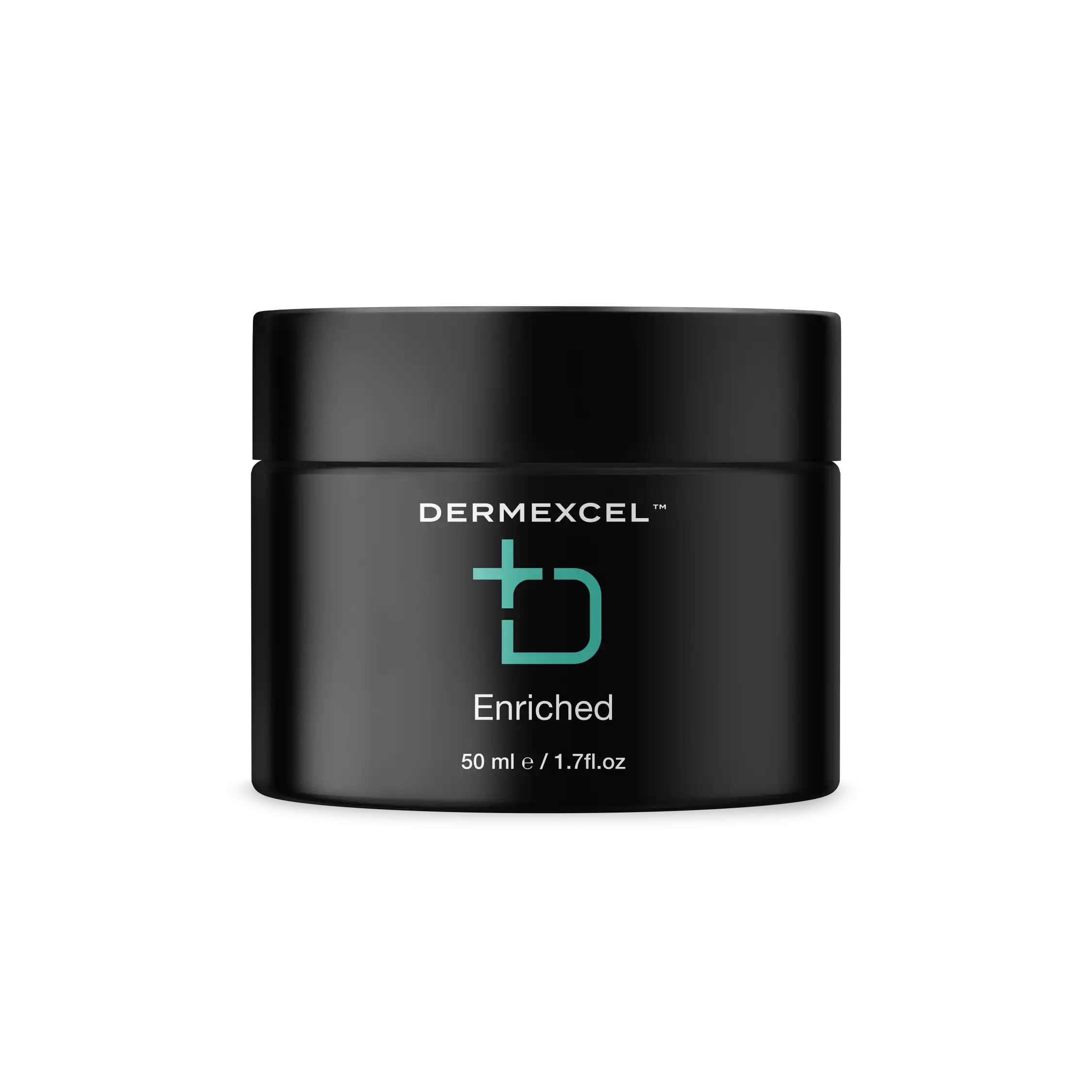
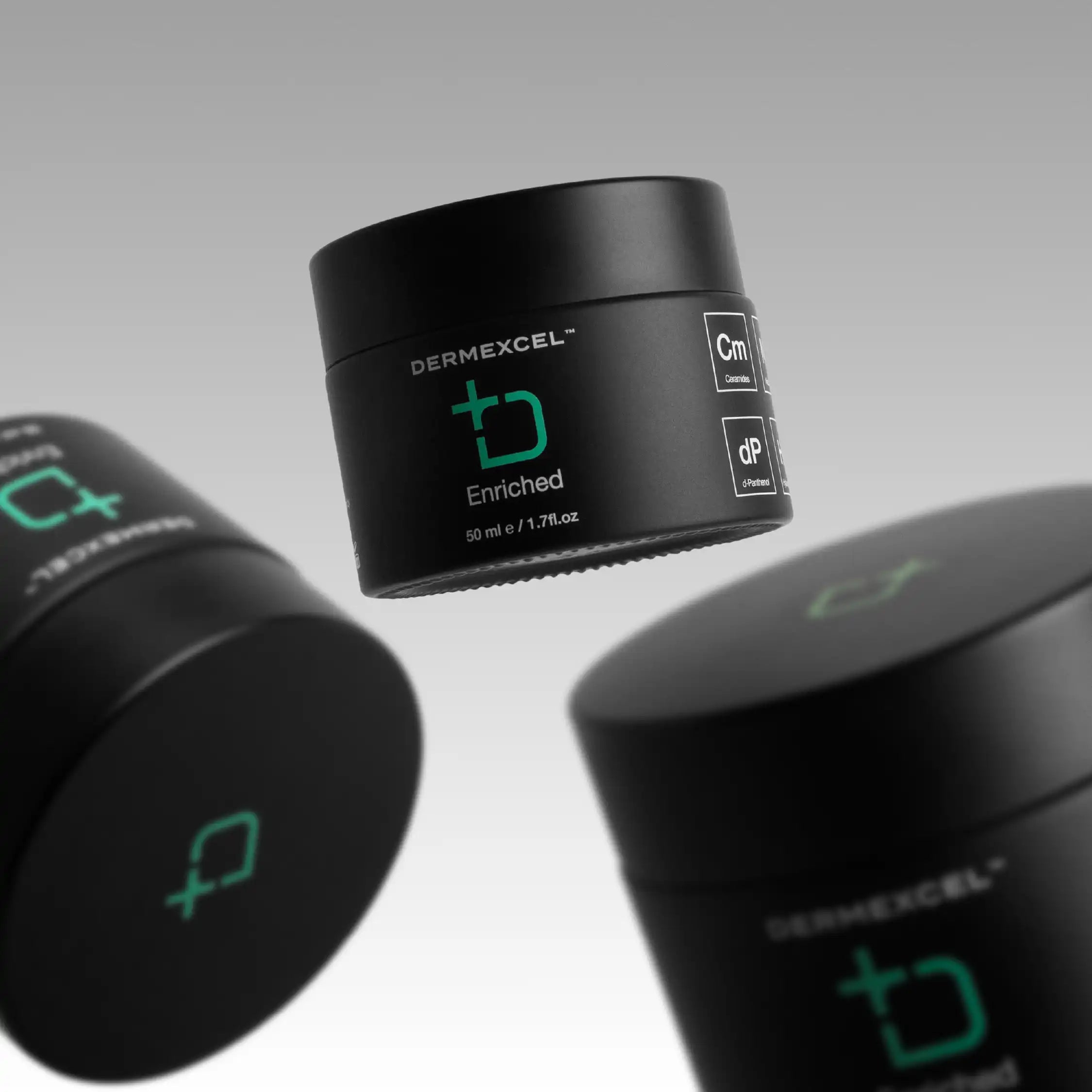
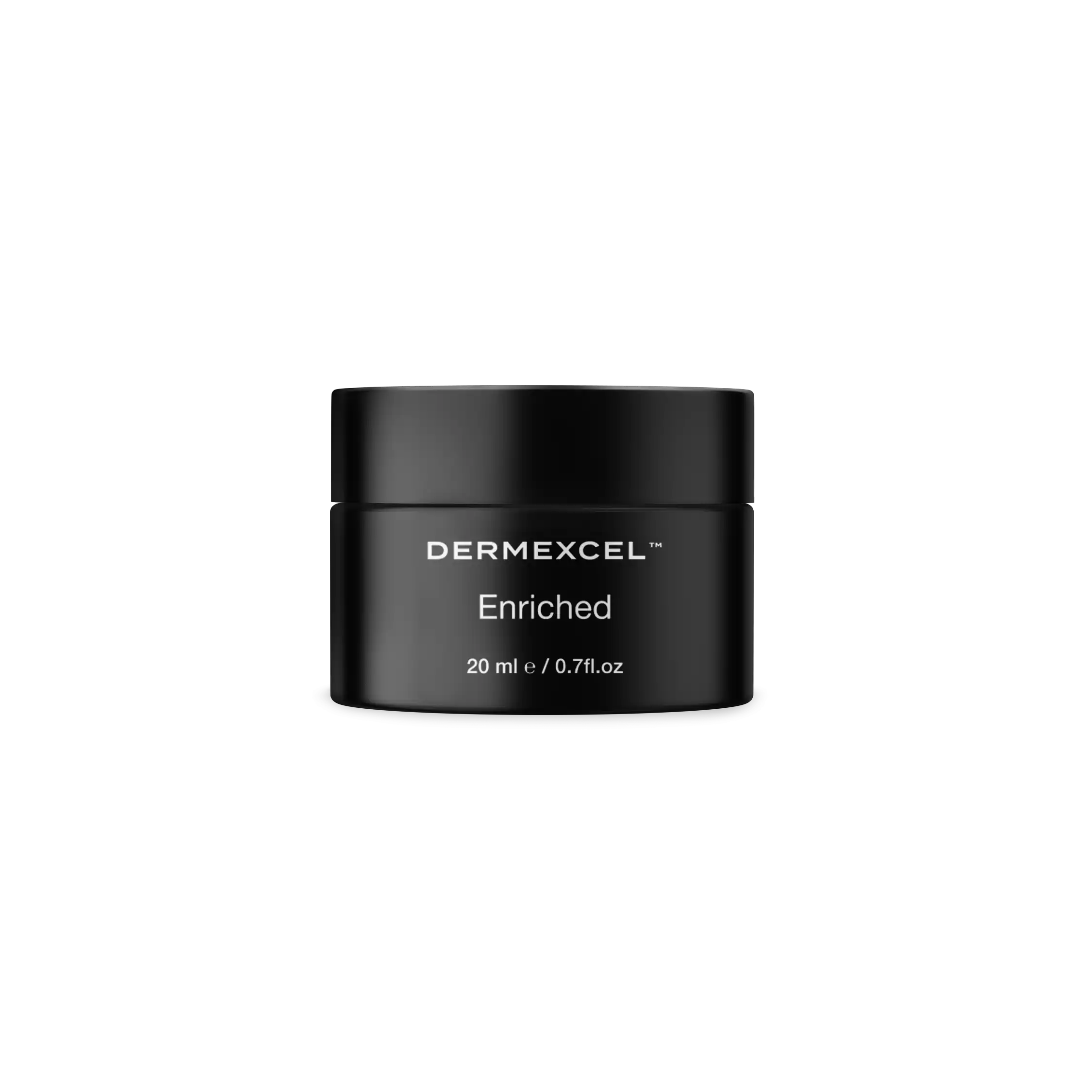





irritated skin

aging

Dry skin

Inflammation

Allergies
Ceramides
Ceramides, a family of lipid molecules naturally present in the skin, are integral to the structure and function of the skin barrier. They are a type of lipid that, along with cholesterol and fatty acids, forms a critical part of the stratum corneum, the outermost layer of the skin. This layer is essential for maintaining skin hydration and protecting against environmental aggressors.
Ceramides, which make up about 50% of the skin's lipid composition, play a pivotal role in maintaining the skin's barrier integrity and preventing transepidermal water loss (TEWL). By doing so, they help keep the skin hydrated and supple.
The loss or reduction of ceramides in the skin barrier is associated with several dermatological conditions, including eczema and psoriasis, where the skin becomes dry, itchy, and prone to irritation and infection. Studies have shown that the application of ceramide-containing moisturizers can effectively improve skin barrier function and increase skin hydration levels.
Ceramides are particularly beneficial for aging skin, which naturally loses ceramides over time, leading to drier and more fragile skin. By replenishing the skin's ceramide content, these products can help combat the signs of aging, such as fine lines and wrinkles.
Ceramides are integral to maintaining skin health, particularly in conditions where the skin barrier is compromised. Their role in hydrating the skin, reducing sensitivity, and improving barrier function makes them an essential component in the management of various dermatological conditions, especially eczema, psoriasis, and dry or aging skin.
Physiological Effects
- Barrier Function: Ceramides are critical components of the skin's lipid barrier. They help to prevent moisture loss and protect against environmental aggressors like pollutants and irritants.
- Hydration: By maintaining the barrier integrity, ceramides keep the skin hydrated, preventing dryness and keeping the skin supple.
- Reducing Skin Sensitivity: They play a role in reducing skin sensitivity and irritation, helping to calm inflamed and reactive skin.
- Anti-aging Properties: Ceramides can improve skin elasticity and firmness, helping to reduce the appearance of fine lines and wrinkles.
- Wound Healing: There is evidence to suggest that ceramides can aid in the skin's natural wound healing process.
Managing Dermatological Conditions
- Eczema and Atopic Dermatitis: Ceramides are often used in the treatment of eczema and atopic dermatitis, where the skin barrier is compromised, leading to dryness, itching, and inflammation.
- Psoriasis: They can help in managing psoriasis by maintaining skin hydration and barrier function, reducing scaling and dryness.
- Aging Skin: Ceramide-containing products are beneficial in anti-aging regimens due to their ability to improve skin barrier function and elasticity.
- Dry Skin (Xerosis): In the treatment of dry skin, ceramides help in restoring skin hydration and barrier function.
- Sensitive Skin: Products containing ceramides are suitable for sensitive skin as they help to restore the skin's natural barrier and reduce irritation.
References
- Del Rosso, J. Q., & Levin, J. (2011). The clinical relevance of maintaining the functional integrity of the stratum corneum in both healthy and disease-affected skin. Journal of Clinical and Aesthetic Dermatology.
- Farwanah, H., Wohlrab, J., Neubert, R. H. H., & Raith, K. (2005). Ceramides and skin function. American Journal of Clinical Dermatology.
- Di Nardo, A., Wertz, P., Giannetti, A., & Seidenari, S. (1998). Ceramide and cholesterol composition of the skin of patients with atopic dermatitis. Acta Dermato-Venereologica.
Niacinamide
Niacinamide offers several benefits for the skin, primarily due to its anti-inflammatory and antioxidant properties. It reduces the redness and inflammation associated with acne, rosacea, and other inflammatory skin conditions. Additionally, niacinamide's ability to improve the skin's barrier function benefits all skin types, particularly those with eczema or mature skin.
Another significant benefit of niacinamide is its role in reducing hyperpigmentation. Studies have shown that it can decrease the transfer of melanin to the epidermis, helping to fade dark spots and even out skin tone.
Niacinamide also plays a role in reducing the visible signs of aging. It has been found to stimulate collagen production and improve skin elasticity, reducing fine lines and wrinkles. Its antioxidant properties further protect the skin from environmental damage, such as pollution and UV radiation, which contribute to premature aging.
The efficacy of niacinamide and its ability to address multiple skin concerns simultaneously has led to its growing popularity in both over-the-counter and prescription skincare formulations.
Physiological Effects
- Barrier Function Enhancement: Niacinamide helps strengthen the skin’s barrier function by increasing the production of ceramides, lipids that keep the skin hydrated and protect against environmental damage.
- Anti-inflammatory Properties: It has notable anti-inflammatory effects, which are beneficial in reducing redness and inflammation associated with acne, eczema, and other inflammatory skin conditions.
- Sebum Regulation: Niacinamide helps regulate sebum production, which controls excess oiliness and can benefit acne-prone skin.
- Hyperpigmentation Reduction: It reduces hyperpigmentation by inhibiting melanosome transfer from melanocytes to keratinocytes, leading to an even skin tone.
- Anti-aging Effects: Niacinamide helps reduce the appearance of fine lines and wrinkles by boosting collagen production and improving skin elasticity.
- Antioxidant Activity: It has antioxidant properties, protecting the skin from oxidative stress and environmental aggressors like UV radiation and pollution.
Managing Dermatological Conditions
- Acne and Oily Skin: Niacinamide effectively manages acne and oily skin by regulating sebum and reducing inflammation.
- Hyperpigmentation and Melasma: Its ability to reduce melanin transfer benefits it in treating hyperpigmentation and melasma.
- Aging Skin: Niacinamide targets wrinkles and loss of firmness.
- Skin Barrier Disorders: Niacinamide is beneficial in treating skin barrier disorders like atopic dermatitis and eczema by enhancing barrier function and hydration.
- Photodamage and Skin Protection: It helps mitigate the effects of photodamage and provides some degree of protection against environmental damage.
References
- Gehring, W. (2004). Nicotinic acid/niacinamide and the skin. Journal of Cosmetic Dermatology.
- Bissett, D. L., Oblong, J. E., & Berge, C. A. (2005). Niacinamide: A B vitamin that improves aging facial skin appearance. Dermatologic Surgery.
- Snaidr, V. A., Damian, D. L., & Halliday, G. M. (2019). Nicotinamide for photoprotection and skin cancer chemoprevention: A review of efficacy and safety. Experimental Dermatology.
- Navarrete-Solís, J. et al. (2011). A Double-Blind, Randomized Clinical Trial of Niacinamide 4% versus Hydroquinone 4% in the Treatment of Melasma. Dermatology Research and Practice, 2011.
d-Panthenol
d-Panthenol's multifaceted effects on skin hydration, barrier strengthening, and wound healing make it a valuable component in the management of various dermatological conditions, from dry skin to post-procedure care.
d-Panthenol, also known as pro-vitamin B5, is a popular dermatological ingredient due to its beneficial effects on the skin. Here's a brief overview of its physiological effects and roles in managing various skin conditions:
Physiological Effects
- Hydration: d-Panthenol is a humectant, meaning it helps to attract and retain moisture in the skin. This leads to increased skin hydration, which can improve skin softness and elasticity.
- Wound Healing and Repair: It plays a role in the synthesis of lipids and proteins, essential for skin repair. d-Panthenol has been shown to accelerate re-epithelialization in wound healing.
- Anti-Inflammatory Effect: d-Panthenol can reduce inflammation, making it beneficial in treating skin irritations and erythema.
- Skin Barrier Strengthening: By enhancing the synthesis of lipids and proteins, d-Panthenol contributes to the strengthening of the skin's barrier function, protecting against irritants and environmental damage.
- Soothing and Softening: It soothes the skin and makes it feel softer and smoother, which can be particularly beneficial for dry or rough skin textures.
Managing Dermatological Conditions
- Minor Wounds and Skin Irritations: Due to its role in skin repair and anti-inflammatory properties, d-Panthenol is used in the treatment of minor wounds, cuts, and skin irritations.
- Dermatitis and Eczema: It helps in managing conditions like dermatitis and eczema by reducing inflammation and enhancing skin barrier function.
- Dry Skin Conditions (Xerosis): Its moisturizing properties make it effective in treating dry skin, providing relief from itching and scaling.
- Post-procedure Care: d-Panthenol is often used in post-procedure care, such as after laser treatments or chemical peels, to aid in skin recovery and reduce inflammation.
References
- Proksch, E., & Nissen, H. P. (2002). Dexpanthenol enhances skin barrier repair and reduces inflammation after sodium lauryl sulphate-induced irritation. Journal of Dermatological Treatment.
- Ebner, F., Heller, A., Rippke, F., & Tausch, I. (2002). Topical use of dexpanthenol in skin disorders. American Journal of Clinical Dermatology.
- Camargo, F. B. Jr, Gaspar, L. R., & Maia Campos, P. M. B. G. (2011). Skin moisturizing effects of panthenol-based formulations. Journal of Cosmetic Science.
Essential Fatty Acids
Essential Fatty Acids: Nourishing Your Skin from Within
In the realm of dermatological science, essential fatty acids (EFAs) have emerged as unsung heroes, offering a multifaceted approach to improving skin health in patients with conditions such as eczema and dry skin.
Pharmacological Advantages
EFAs are not only instrumental in maintaining the skin's structural integrity but also possess anti-inflammatory properties. They serve as precursors for pro-resolving lipid mediators like resolvins and protectins, which help reduce skin inflammation, itching, and redness—common symptoms of eczema.
Physiological Harmony
EFAs contribute to maintaining the balance of skin hydration. They enhance the skin's ability to retain water, leaving it supple and hydrated. Moreover, EFAs can modulate the skin's immune response, reducing the severity of allergic reactions and flare-ups often seen in dermatological conditions like eczema.
Biochemical Brilliance
Essential fatty acids, including omega-3 and omega-6, are the building blocks of the skin's lipid barrier. This barrier acts as a protective shield, preventing excessive moisture loss and shielding the skin from external aggressors. EFAs play a pivotal role in maintaining this barrier's integrity by contributing to the synthesis of ceramides and lipids that bind skin cells together.
References
- Elias, P. M. et al. (2008). Skin diseases associated with decreased epidermal lipogenesis. Annals of the New York Academy of Sciences, 1141(1), 1-13.
- Ziboh, V. A. et al. (2000). Biochemical basis of the essential fatty acid requirement for normative growth in neonatal baboons. American Journal of Clinical Nutrition, 71(1), 3-11.
- Serhan, C. N. (2014). Pro-resolving lipid mediators are leads for resolution physiology. Nature, 510(7503), 92-101.
- Levesque, A. et al. (2018). Omega-3 fatty acids: Anti-inflammatory and skin barrier benefits. Omega-3 Fatty Acids: Keys to Nutritional Health, 303-315.
- Nicolaou, A. (2013). Eicosanoids in skin inflammation. Prostaglandins, Leukotrienes, and Essential Fatty Acids, 88(1), 131-138.
- Meydani, S. N. et al. (2018). Nutrition interventions in aging and age-associated diseases. Annals of the New York Academy of Sciences, 1418(1), 34-51.
Hyaluronic acid
Hyaluronic acid (HA) is a naturally occurring glycosaminoglycan found throughout the body's connective, epithelial, and neural tissues. Most abundantly present in the skin, eyes, and synovial fluid, HA is renowned for its exceptional capacity to retain moisture — a single gram can hold up to six liters of water.
In skincare, the primary appeal of hyaluronic acid lies in its unparalleled hydrating abilities. As a humectant, HA attracts and retains moisture from the environment, providing intense hydration to the skin. This hydrating property contributes significantly to maintaining skin plumpness, suppleness, and elasticity.
Beyond hydration, hyaluronic acid also plays a vital role in skin repair and regeneration. It supports the skin's healing and repair processes, and its anti-inflammatory properties help calm irritated skin. Moreover, HA's ability to promote collagen production, a crucial protein for skin elasticity, further underscores its anti-aging benefits.
The molecular size of hyaluronic acid influences its skin penetration and efficacy. High-molecular-weight HA remains on the skin's surface, providing hydration and forming a barrier against moisture loss. In contrast, low-molecular-weight HA penetrates deeper into the skin's layers, offering more profound hydrating and rejuvenating effects.
Hyaluronic acid's remarkable ability to hydrate, improve skin elasticity, aid in wound healing, and provide antioxidant protection makes it valuable in managing various dermatological conditions, particularly aging, dryness, and sensitive skin.
Physiological Effects
- Hydration: Hyaluronic acid is a powerful humectant that can hold up to 1000 times its weight in water, significantly enhancing skin hydration and leading to plumper, more hydrated skin.
- Skin Elasticity and Wrinkle Reduction: By increasing skin moisture, it improves skin elasticity, reduces the appearance of fine lines and wrinkles, and gives the skin a more youthful appearance.
- Wound Healing: It plays a role in wound healing due to its ability to regulate inflammation levels and signal the body to build more blood vessels in the damaged area.
- Barrier Enhancement: Hyaluronic acid helps reinforce the skin's natural barriers, protecting against environmental factors and retaining moisture.
- Antioxidant Properties: It provides antioxidant defense against free-radical damage from the sun and pollution.
Managing Dermatological Conditions
- Aging Skin: Its ability to reduce wrinkles and improve skin elasticity makes it popular in anti-aging skincare products.
- Dry Skin: Hyaluronic acid is beneficial in treating dry skin conditions by providing intense hydration.
- Wound Care: Its role in wound healing is leveraged in post-procedure care, such as after laser treatments, and in healing minor cuts and abrasions.
- Acne Scars: It can help treat acne scars by promoting skin regeneration and reducing inflammation.
- Sensitive Skin: Hyaluronic acid is suitable for sensitive skin due to its gentle nature. It provides hydration without irritating.
References
- Papakonstantinou, E., Roth, M., & Karakiulakis, G. (2012). Hyaluronic acid: A key molecule in skin aging. Dermato-endocrinology.
- Jegasothy, S. M., Zabolotniaia, V., & Bielfeldt, S. (2014). Efficacy of a new topical nano-hyaluronic acid in humans. The Journal of Clinical and Aesthetic Dermatology.
- Wollina, U., & Abdel-Naser, M. B. (2019). Hyaluronic acid in the treatment and prevention of skin diseases: Molecular biological, pharmaceutical and clinical aspects. Skin Pharmacology and Physiology.
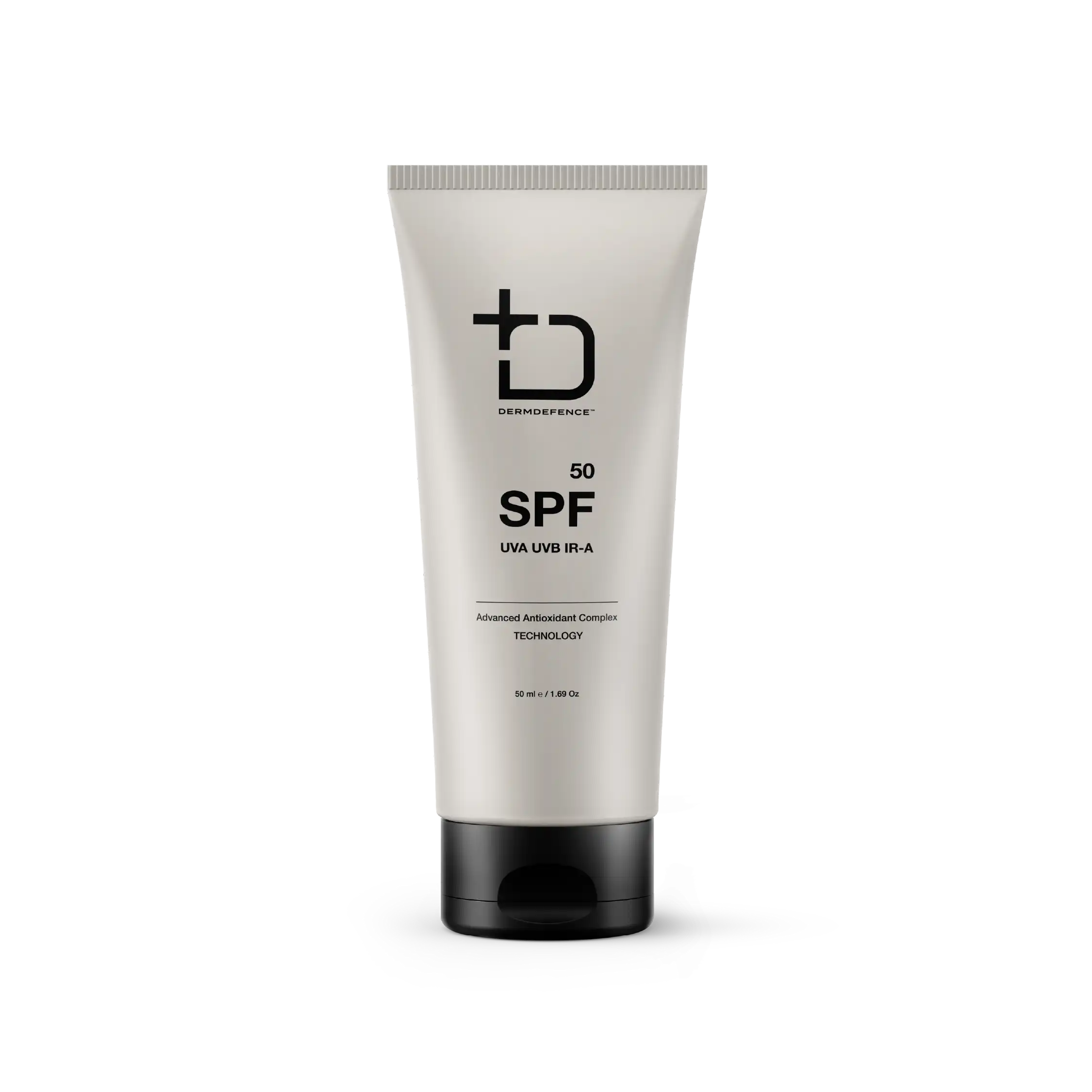
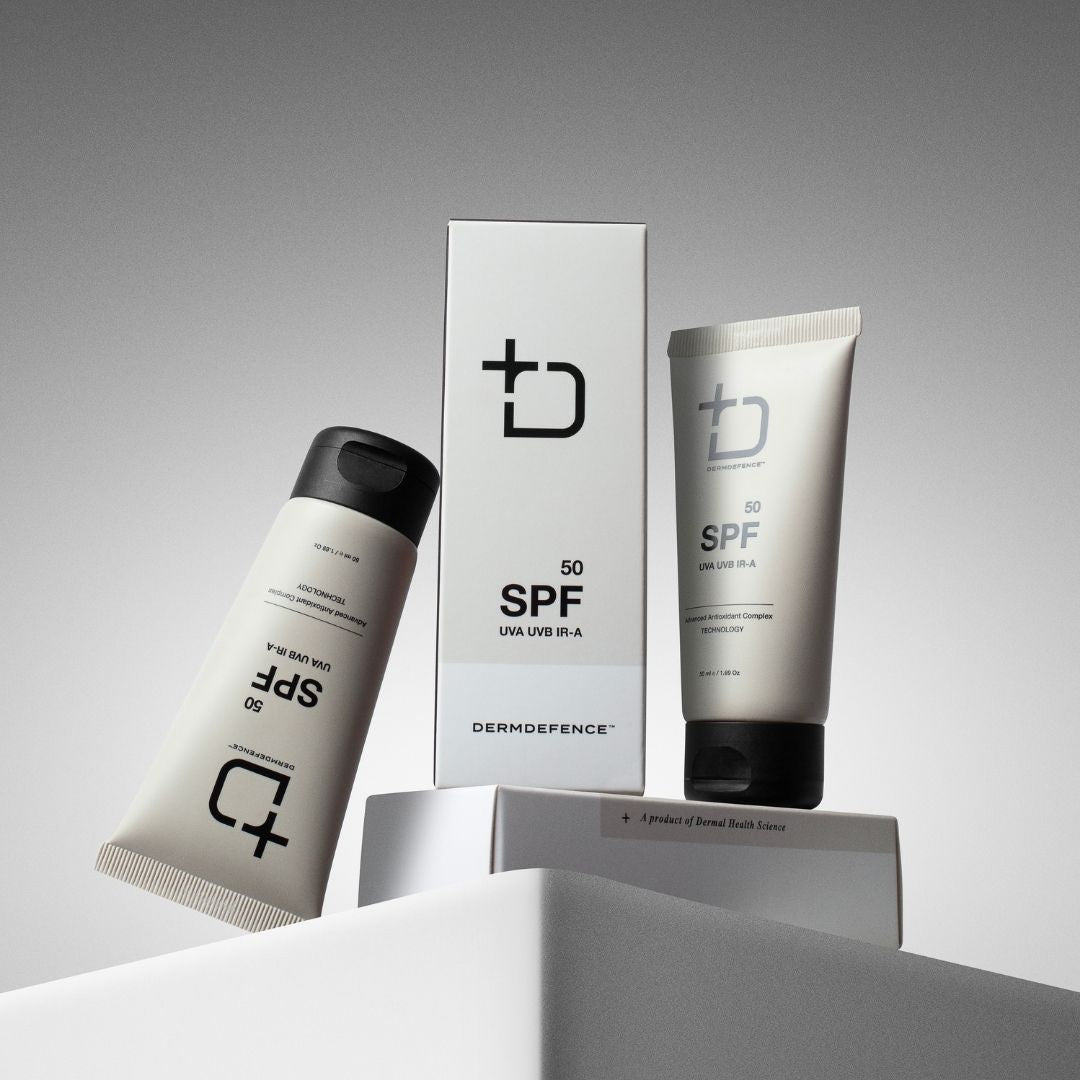




SIZE: 50 mL

Antioxidant

anti-aging

DNA repair

sun protection

Moisturizing
Coenzyme Q10
CoQ10 is a potent ingredient that offers comprehensive skin health and appearance benefits. Its role in energy production and its antioxidant and anti-aging properties make it invaluable for photoprotection, anti-aging, and overall skin vitality. Its incorporation into DermExcel sunscreen represents a holistic approach to skin health, addressing protective and restorative needs.
Physiological Impact
- Skin Barrier Enhancement: CoQ10 contributes to the strength and health of the skin barrier, improving its ability to retain moisture and protect against external irritants and pollutants.
- Skin Repair and Regeneration: It supports the skin's natural ability to repair itself and regenerate, maintaining a healthy, youthful appearance. This is particularly beneficial in mature skin, where natural levels of CoQ10 may be depleted.
Pharmacological Advantages
- Anti-Aging Effects: CoQ10's antioxidant properties contribute to its anti-aging effects. By reducing oxidative stress, it helps to minimize the visible signs of aging, such as wrinkles and fine lines.
- Photoprotection: It enhances the skin's defense against photoaging caused by exposure to UV rays. CoQ10 helps to mitigate the degradation of collagen and elastin, proteins essential for maintaining skin elasticity and firmness.
Biochemical Benefits
- Cellular Energy Production: CoQ10 plays a crucial role in the mitochondrial electron transport chain, which is essential for the production of ATP, the primary energy currency of the cell. This function is vital for maintaining the health and vitality of skin cells.
- Antioxidant Properties: It acts as a lipophilic antioxidant, neutralizing free radicals and preventing oxidative damage to cell membranes, proteins, and DNA. This is particularly important in the skin, which is frequently exposed to oxidative stress from environmental factors like UV radiation.
Vitamin E
The fat-soluble Vitamin E's benefits in maintaining skin health and appearance are well-acknowledged in both cosmetic and clinical dermatology. Comprising a group of eight compounds, including four tocopherols and four tocotrienols, Vitamin E is known for its role in protecting cell membranes from oxidative damage.
Vitamin E is celebrated in skincare for its ability to neutralize free radicals caused by environmental stressors such as UV radiation and pollution. These free radicals can lead to premature skin aging, making Vitamin E a valuable ingredient in anti-aging skincare products. Its antioxidant action helps to protect the skin from damage, reduce the appearance of wrinkles, and improve skin texture and tone.
Additionally, Vitamin E is known for its moisturizing benefits. It helps to strengthen the skin barrier, reduce moisture loss, and keep the skin hydrated and supple. This makes it especially beneficial for dry and damaged skin.
Vitamin E also has anti-inflammatory properties, making it beneficial in soothing and calming irritated skin. This has implications for conditions such as dermatitis and acne, where inflammation plays a key role.
Physiological Effects
- Antioxidant Protection: Vitamin E neutralizes harmful free radicals in the skin, preventing oxidative stress and damage caused by environmental factors like UV radiation and pollution.
- Moisturization: It has moisturizing properties, helping to improve skin hydration and alleviate dryness.
- Wound Healing: Vitamin E may assist in the skin's healing process, although its efficacy in wound healing is still a subject of research.
- Photoprotection: While not a sunscreen, it can provide some degree of photoprotection by strengthening the skin's defense against UV-induced damage.
- Anti-Inflammatory Effects: It helps reduce skin inflammation and is beneficial in managing conditions like eczema and psoriasis.
Managing Dermatological Conditions
- Skin Aging: Its antioxidant properties make it useful in anti-aging skincare products to protect against free radical damage and improve skin appearance.
- Dry Skin Conditions: Vitamin E's moisturizing effects are beneficial in treating dry skin and improving overall skin texture.
- Inflammatory Skin Diseases: It can be helpful in soothing inflammatory skin conditions like eczema and psoriasis.
- Sun Protection and Repair: Vitamin E is included in sunscreens and after-sun products for its ability to mitigate sun damage.
- Scar Treatment: Some studies suggest Vitamin E may help reduce the appearance of scars, although evidence is mixed.
References
- Thiele, J. J., Hsieh, S. N., & Ekanayake-Mudiyanselage, S. (1998). Vitamin E: Critical Review of Its Current Use in Cosmetic and Clinical Dermatology. Dermatologic Surgery, 24(7), 805–813.
- Ratz-Łyko, A., & Arct, J. (2016). Anti-inflammatory and anti-aging properties of active skin care ingredients. Journal of Clinical and Aesthetic Dermatology, 9(9), 36–40.
- Keen, M. A., & Hassan, I. (2016). Vitamin E in dermatology. Indian Dermatology Online Journal.
- Ekanayake-Mudiyanselage, S., & Thiele, J. (2007). Vitamin E in human skin: Organ-specific physiology and considerations for its use in dermatology. Molecular Aspects of Medicine.
- Nachbar, F., & Korting, H. C. (1995). The role of vitamin E in normal and damaged skin. Journal of Molecular Medicine.
Broad Spectrum Filters
Tinosorb® M and Tinosorb® S represent sophisticated advancements in sun protection technology.
Tinosorb® M
- Biochemical Action: A unique UV filter due to its ability to function through absorption, reflection, and scattering of UV rays.
- Physiological Impact: The triple-action mechanism of Tinosorb® M offers comprehensive sun protection. By mitigating the penetration of both UVA and UVB rays, it significantly reduces the risk of DNA damage, photoaging, and carcinogenesis. Its ability to remain on the skin's surface reduces systemic exposure, making it a safer option with minimal potential for irritation or allergic reactions.
Tinosorb® S
- Biochemical Action: A broad-spectrum UV filter with a molecular structure that effectively absorbs both UVA and UVB rays. Additionally, it enhances the photostability of other UV filters, making the sunscreen formulation more effective over time.
- Physiological Impact: By providing extensive UVA and UVB protection, Tinosorb® S plays a crucial role in preventing short-term sun damage like sunburn and long-term risks such as skin aging and skin cancer. Its photostability ensures sustained protection during sun exposure, and its compatibility with other UV filters means it can be used to formulate sunscreens that are both effective and suitable for sensitive skin.
Sunscreen
Using sunscreen is a fundamental aspect of skin care and preventive dermatology. It's essential for reducing the risk of skin cancers and photoaging and maintaining overall skin health in the face of constant exposure to UV radiation.
Sunscreen is a vital skincare product designed to protect the skin from the harmful effects of ultraviolet (UV) radiation from the sun. Two primary types of UV radiation affect the skin: UVA and UVB. UVA rays penetrate deep into the skin and are primarily responsible for aging and long-term skin damage, whereas UVB rays cause sunburn and play a key role in developing skin cancer.
Sunscreen products work by either absorbing, reflecting, or scattering sunlight. They contain chemical compounds that absorb UV radiation and convert it into a small amount of heat or physical compounds (like zinc oxide or titanium dioxide) that act as a physical barrier, reflecting UV light away from the skin.
The effectiveness of sunscreen is measured by its Sun Protection Factor (SPF). SPF indicates how well the sunscreen protects against UVB rays. For example, an SPF of 30 means it would take 30 times longer for your skin to burn than without sunscreen. However, it's important to note that no sunscreen can block 100% UV rays.
Regular use of sunscreen with an SPF of at least 30 can reduce the risk of skin cancer, prevent sunburn, and slow down the skin's aging process.
Managing Dermatological Conditions
- Prevention of Sunburn: Sunscreen protects the skin from UVB rays, which cause sunburn. This reduces the immediate risk of skin damage and discomfort.
- Skin Cancer Prevention: Regular use of sunscreen significantly lowers the risk of developing various types of skin cancer, especially melanoma, squamous cell carcinoma, and basal cell carcinoma.
- Prevention of Photoaging: Sunscreen also shields the skin from UVA rays, which penetrate deeper into the skin and are primarily responsible for photoaging, including wrinkles, leathery skin, and sunspots.
- Protection Against Photosensitivity: Sunscreen helps prevent flare-ups triggered by sun exposure for individuals with photosensitive skin conditions like lupus or rosacea.
- Hyperpigmentation and Melasma: It aids in preventing and managing hyperpigmentation and melasma, conditions exacerbated by sun exposure.
- General Skin Health: Sunscreen helps maintain overall skin health and integrity by protecting the skin from UV damage.
References
- Burnett, M. E., & Wang, S. Q. (2011). Current sunscreen controversies: a critical review. Photodermatology, Photoimmunology & Photomedicine.
- Green, A. C., et al. (2011). Reduced melanoma after regular sunscreen use: randomized trial follow-up. Journal of Clinical Oncology.
- Hughes, M. C. B., et al. (2013). Sunscreen and Prevention of Skin Aging: A Randomized Trial. Annals of Internal Medicine.


























